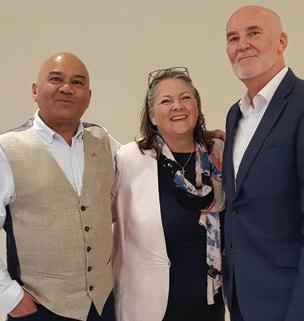



































6 : UKREiiF
the UK and beyond.
Summary of the UK’s Real Estate Investment & Infrastructure Forum.
7 : PROPERTY & CONSTRUCTION News from across the sector.
8 : CONSTRUCTION THEFT
Review by the National Federation of Builders
9 : PROPERTY INVESTMENT
Gearing your Property Portfolio
Analysis by Nick Thorpe
10 : WOMEN IN BUSINESS
13
14 : CASHFLOW SUPPORT
The impact of late payment Insight by Paul Daine, Premium Collections
19 : PAY PER CLICK
Maximising PPC Profitability - analysis from Zak Mulla, Exceed
16 : #SBSEVENT2025
Exclusive interview with Theo Paphitis
20 : EXPORTING & LOGISTICS






Subscription is easy and FREE. Simply visit BusinessConnectMagazine.co.uk/ subscribe where you can register your details to receive a printed copy by posts or an electronic link to the magazine as soon as it is published.
Here at Business Connect Magazine we are on the lookout for both news articles relating to business activity across all sectors, and educational articles that can help businesses at any level.
If you regularly send out press releases, or if you are looking for press coverage of a newsworthy event, please get in touch either by phone or send an email to editorial@ BusinessConnectMagazine.co.uk

Column from Tony Goodman, MBE Commentary also from ASL worldwide

22 : LOSS PREVENTION
Protecting your supply chain - review from Paul King, Equipt Security
23 : UTILITIES
Managing your business water - review from Water Plus.
24 : E COMMERCE
Creating a winning digital strategy with Craig Thompson, Dmac Media
25 : IT SUPPORT
Review of IT Support for small businesses with Ram Gupta from Nybble
26 : OUT & ABOUT Networking across the region and beyond.
27 : DTX MANCHESTER 2025 Preview of the event taking place 2/3 April.
28 : WELLBEING
Do you benefit from nap time? with Susan Leigh from Lifestyle Therapy
29 : PLACES TO MEET
List of venues supporting business requirements.
30 : DIARY DATES
List of business networking events.




We offer a fantastic range of advertising opportunities or feature articles from double page spreads through to eighth page adverts that offer promotional opportunities at extremely reasonable rates. The rates are the same for editorial and adverts.
Discounted packages are available on request for series bookings.
For more information please download a copy of our media pack found on our website: BusinessConnectMagazine.co.uk/ advertise or alternatively please email: advertising@BusinessConnectMagazine. co.uk or phone:


The Payment Systems Regulator (PSR) has confirmed the maximum reimbursement limit for victims of Authorised Push Payment (APP) scams starting from 7 October.
Having reviewed all the feedback and information received, the PSR board has announced that the maximum reimbursement limit for Faster Payments will be £85,000.
The PSR’s requirements will provide protections to people who fall victim to scams - with over 99% of APP claims
covered by the reimbursement cap. It will also give firms strong financial incentives to continue to make improvements to their fraud prevention controls.
The Bank of England, as the operator of CHAPS, has also considered the feedback made in relation to CHAPS as part of the same consultation.
The Bank has confirmed that the maximum reimbursement for CHAPS will be £85,000.
Analysis of the Bank of England’s data in global financial services Ebury’s SME Borrowing Tracker shows that SMEs decreased their debt by £4.4 billion across 2024, reinforcing nearly three years of falling debt among SMEs, following the significant ‘debt pile’ accumulated during the pandemic.
However, the final three months of 2024 marked the first quarterly uptick in SME loans outstanding since the pandemic (Q4 2020), in a sign that perhaps SMEs are once again seeking out credit to invest and support their growth ambitions. It also points to improved confidence among lenders, with appetite for lending improving, particularly among challenger and specialist banks.
Between 31st December 2023 and 31st December 2024, SME debt fell by a net sum of £4.4 billion, from £175.4 billion to £171.9 billion. When compared to the total outstanding amount at the close of 2020 (£202.1 billion), current debt levels are now 17% or £33 billion fewer.
The borrowing boom triggered by the Covid-19 pandemic saw net loans of £47.3 billion accumulated in 2020 as businesses sought financial help to survive the unprecedented economic restrictions. With the Bank of England dramatically hiking interest rates in 2022, and in turn, surging the cost of borrowing, SMEs have been rushing to minimise their debt exposure.
The majority of SME lending during the pandemic was provided through the government-backed Coronavirus
Business Interruption Loan Scheme (CBILS) schemes, of which Ebury was an accredited lender. The Government’s own figures show that £25.9 billion was loaned out to around 100,000 firms under the CBILS scheme – under a third (30%) of CBILS facilities have been repaid.
That business support was launched amid a broader package of help including additional loans, the Bounce Back Loan Scheme, capital repayment holidays, extended overdrafts and asset-based finance.
Phil Monkhouse, UK Country Manager at Ebury, commented: “The Bank of England’s 50 basis points of rate cuts in 2024 have eased borrowing costs, giving SMEs some relief and renewed confidence that rates are moving in the right direction - encouraging many to access credit and re-invest in their businesses to accelerate their growth plans.
“But challenges remain. Many SMEs are still managing high debt repayments after years of rising costs and economic uncertainty, with many still repaying the significant debt accumulated during the pandemic. Unlike larger corporates, they have tighter margins and fewer buffers against shocks, making financial resilience critical.
“With Trump’s protectionist policies threatening operational costs and the UK’s own growth outlook on shaky ground, there could be more instability on the way.”
Data challenges leave 83% of businesses unprepared for mandated CSRD reporting
Over four-fifths (83%) of businesses lack confidence in the audit-readiness of their ESG data for compliance with the Corporate Sustainability Reporting Directive (CSRD).
This is according to a new survey of 1,000 senior IT and data leaders across the UK and France by Semarchy, specialists in master data management (MDM) and data integration.
While 65% of eligible organisations aspire to be audit-ready and meet looming reporting deadlines within the next 12 months, a quarter (25%) today lack confidence in the quality and reliability of their ESG data and fewer than a third (27%) believe they currently have the necessary data management and systems to meet the strict reporting requirements.
At the same time, around one in three (31%) organisations say continued uncertainty around the guidelines has them taking a measured approach to addressing compliance. This response is amidst rumblings that the EU will announce a simplified package of sustainability directives in February.
The survey also examined accountability for company-wide CSRD compliance, with 68% of businesses stating that senior data executives, including Chief Data Officers (CDOs) and Chief Information Officers (CIOs), play a pivotal role. This suggests a new level of responsibility for IT organisations as they aggregate vast amounts of data from disparate sources into mandated reports used by investors, analysts, and other stakeholders to evaluate a business’s sustainability performance and risks.
This compares to just 54% for senior sustainability roles, such as Head of Sustainability or ESG. A surprisingly small number (33%) say that their Chief Financial Officer (CFO) is involved in the compliance process despite the heavy financial implications of regulatory change.
To accelerate audit readiness for CSRD reporting, over two-thirds (68%) of companies plan to allocate more than 10% of their annual IT budgets to CSRD compliance, with over a quarter (26%) planning to invest more than 20%.
While the poll of business leaders shows a clear gap in readiness,
Semarchy believes that by getting back to the basics of master data management, the CSRD compliance process can be simplified and automated. Indeed, according to the survey, 89% of companies have been collecting and reporting on ESG data for at least a year, with more than half (58%) doing so for more than three years.
“With regulatory uncertainty and rising expectations around sustainability reporting, many organisations view compliance as a significant hurdle. The challenge isn’t always a lack of data - it’s often about ensuring its reliability and trustworthiness,” said Hervé Chapron at Semarchy.
“Fortunately, solving this doesn’t demand excessive IT spending or technical sprawl. Most companies already collect the data they need for CSRD compliance; adopting centralised, scalable tools allows them to meet regulatory and business deadlines with minimal disruption. Organisations must shift their perspective on compliance and reporting. Rather than viewing it as a complex burden, businesses can leverage the centralised data for better decision-making and create long-term value. Simplified data management turns audit-readiness into a strategic advantage.”
Renee Murphy, Principal Analyst at Verdantix said, “While most organisations are collecting ESG data, a staggering 83% are still not prepared for CSRD audits, according to Semarchy’s new findings.
“This gap highlights the critical need for businesses to address the key blockers hindering compliance: first, the challenge of collecting data consistently across the entire supply chain; second, the need to produce digitally tagged, machine-readable reports; and third, the issue of data fragmentation.
“A robust data management platform can tackle these challenges by ensuring data is trusted, seamlessly moved across systems, and easily utilised for reporting. By centralising and automating data workflows, businesses can ensure they are audit-ready and able to meet evolving regulatory demands with confidence.”
Confirmed by the Government at the end of January, drivers in Greater Manchester will not face additional charges, as the area is set to benefit instead from 117 new lower and zeroemission buses in an £86 million scheme to help clean up the region’s air. Defra and the Department for Transport have rigorously assessed an investment-led plan proposed by local councils and concluded it will meet legal obligations to reduce nitrogen dioxide pollution.
While local authorities in other areas have found that a Clean Air Zone is the best route to cutting nitrogen dioxide pollution, proposals submitted to government included evidence that Greater Manchester can achieve compliance within legal limits faster without charging.
Today’s decision rules out a Clean Air Zone, meaning motorists will not be
charged to drive into the area. Instead, there will be a fleet of new buses and traffic-calming measures to improve air quality in the region.
The investment-led package includes:
• £51.1m towards bus investment, including 40 zero emission buses, 77 Euro VI standard buses and charging infrastructure
• £5m for local traffic management measures
• £8 million to support moving Greater Manchester’s taxi fleet to cleaner vehicles
• Up to £21.9m for administration, delivery, monitoring and other associated costs.
Local leaders have also been told they can review and cancel contracts relating to the Clean Air Zone, such as signs and cameras.
Air Quality Minister Emma Hardy said: “Air pollution is damaging people’s health and the environment. Its impacts are felt more by low-income communities, making health and social inequalities worse.
“To improve our health, wellbeing and the environment, we must improve air quality. Local authorities know their communities well and so they need to develop plans that are most effective for their local area, and I am pleased that Greater Manchester has found a clear way to reduce emissions without the need to charge motorists.”
Minister for the Future of Roads, Lilian Greenwood said: “Having completed the groundbreaking Bee Network buses, Greater Manchester is making fantastic progress in building a modern, sustainable and truly integrated transport network.
“Manchester will be able to reduce
pollution from transport without having to charge motorists, and new, cleaner buses will help Mancunians get around easily while still bringing down emissions across the city.
Mayor of Greater Manchester Andy Burnham said: “This is the right decision for Greater Manchester and it gives people here the certainty they have long needed.
“Because we have implemented the first phase of the Bee Network on time and on budget, the Government clearly trusts us to deliver and has seen the evidence that our approach is working. The Bee Network is cleaning up our air and keeping the cost of travel as low as possible.
“We will now continue to work towards an all-electric bus fleet whilst investing in local traffic measures and supporting our GM-licensed taxi drivers to upgrade to cleaner vehicles.”

Fletcher, Policy Director at Greater Manchester Chamber, said: “There are many things to welcome in the Chancellor’s speech with a clear

ambition to kickstart growth by tackling the barriers that have played a part in holding back critical parts of the economy.
“Confirmation of the recently announced plans for Old Trafford, reference to the great work being done in Stockport and outlining a pilot programme with the Office of Investment and the National Wealth Fund in GM are to be welcomed.
“There were other announcements around changes to planning procedures and other areas where the pace of infrastructure development will be speeded up and restrictions removed.
“However for many business owners
listening to this they will not be comforted at all by the Chancellor’s confirmation of the NIC rise announced in the Budget and set to hit them from April onwards.
“We are hearing from businesses stating this will cost tens of thousands of pounds and for them the promise of faster developments will seem pretty meaningless.
“The announcement of a review of the Treasury’s ‘Green Book’ – the mechanism they use to assess the ‘value’ of infrastructure schemes and which naturally favours development in high value areas such as the South East, and therefore a major blocker of growth in the North, is long overdue
At our events, you won’t find stiff handshakes or forced conversations. Intsead, you’ll discover a vibrant community where ideas flow, collaborations spark, and doors open. Each event has 60-80 exhibitors, along with hundreds of visitors throughout the day (10am - 3pm).
Our 2025 list of events has now been confirmed. Attendance is free of charge for visitors:
and should help rebalance critical developments across the country.
“The ambitious plans for Oxford and Cambridge and expansion of Heathrow were other critical parts of the speech and we will be looking closely at how these will help local economies here in the north.
“In fact a lot of the final elements of the speech bore a passing resemblance to what the idea and concept behind the Northern Powerhouse was when it was launched in 2014.
“That never materialised on the ground and hopefully the plans announced today and going forward will make up that wasted decade at pace and at speed.”
Newly established private equity firm Northcote Equity, has announced the first and final close of its maiden fund, ‘Northcote Fund I’, at its hard cap of £160million, just 16 weeks after launching the fundraise.
Northcote specialises in technology and services investments in the UK and Ireland. Taking a high-conviction and flexible approach, the team can support both minority and majority structures, investing up to £30m of equity in buyout and growth capital investments.
Prior to founding Northcote, its founding partners, Matthew Charman, Scott Fairlie and Charles Dale spent nearly a decade together at one of Europe’s best-performing private equity funds. The Fund has attracted commitments from leading institutions, university endowments and family offices based in the US and Europe.
On the successful close of the maiden fund Matthew Charman said:
“Our vision for Northcote has been clear from day one - create a leading boutique manager for ambitious founders and management teams seeking a first-time partner. The time came to leave the comfort of our jobs, take the entrepreneurial leap and refocus on the part of the market we’re most passionate about and believe can generate the highest returns. Ultimately that message resonated very strongly with the investor community, which translated into demand in excess of £300m for the Fund.”
“Our ethos is to keep investing simple and focused,” said Scott Fairlie: “For us, the simplicity comes through supporting the founders we find truly exciting, and the focus is in sticking to what we know. Today, we’re humbled and proud to be backed by the founders we’ve backed in the past who are investing their own hard-earned capital and are now on hand to guide the next generation of entrepreneurs.”
At the end of May, UKREiiF 2025 will once again bring stakeholders from across the UK together to connect people, places and businesses to drive sustainable, inclusive and transformative investment and regeneration.
Bringing together the UK Government, every local authority, and a network of investors, developers, and endusers, UKREiiF facilitates three days of invaluable connections, conversations, and deal-making across the built environment sector.
Beyond unlocking transformational growth across the UK, the event tackles the industry’s most pressing challenges. With an all-star lineup of speakers, UKREiiF fosters insightful discussions that shape the future of investment, development, and regeneration.
In 2025, UKREiiF expects:
• 16,000+ attendees
• 1,250+ speakers
• £300bn+ of opportunities
• 60+ stages
• 1,750+ investors
• 1,000+ occupiers
• 1,750+ developers
• 275+ councils
Alongside these incredible numbers, the event will welcome more than 50 pavilions, including a brand new London pavilion which will serve as a central hub, spotlighting London’s projects and initiatives.
It will bring together representatives from London Boroughs and key private sector organisations committed to supporting and advancing the capital’s growth and development.
With over 60 stages, UKREiiF will


host an extensive lineup of panel discussions, interactive activities, and networking opportunities. Covering every aspect of the built environment, the event will feature thought leaders and experts across sectors, including BTR & PBSA, Commercial & Workspace, Construction & Design, Diversity & Inclusion, Social Value, Education, Energy, Healthcare, Heritage, Industrial, Investment &
Finance, Planning, Politics & Policy, Regeneration & Development, Residential & Housing, Retail & Hospitality, Science & Industrial Strategy, Sustainability, Technology & Innovation, Transport & Infrastructure, and more.
Of course Business Connect are media partners at such an important event - we’ll hopefully see you there!

MAG (Manchester Airports Group) which owns and operates East Midlands Airport (EMA) has announced Prologis, logistics property owner, developer and investor, as its partner to take forward the development of a new industrial logistics and advanced manufacturing park near EMA.
The new park is a designated East Midlands Freeport tax site which will stimulate economic growth, investment and employment in the region, helping to unlock $1.3bn (£1bn) of investment in and around the airport.
It will contribute to a corridor of innovation around MAG’s airports across the North, Midlands and South East England in key growth-driving sectors including life sciences and advanced manufacturing. The development site, south of the airport,
will offer operators the option of various tax and customs relief and simplified import / export procedures.
A planning application for the new park has been submitted to North West Leicestershire District Council, which, if approved, will bring up to 2,000 new jobs, £132m of economic growth per year (GVA) to the East Midlands, whilst contributing £9m of additional business rates.
As part of the partnership, Prologis will also deliver a dedicated centre for logistics job training and education in Leicestershire.
The centre will host the Prologis Warehousing and Logistics Training programme - providing local people with the skills and experiences needed to begin and progress their career in logistics.


Salford City Council have approved plans for a £250m data centre at Peel Waters’ Halo West site, in Salford, Greater Manchester.
Peel Waters had previously secured planning permission to redevelop the six-acre industrial site in July 2024, since the planning was granted, they have worked jointly with Digital Land & Development on the planning for the much-needed data centre.
The site of the approved data centre is located between Eccles and Irlam, off Liverpool Road, just north of Salford Community Stadium and will directly address the digital infrastructure needs of the UK, making the development ‘critical’ for the country’s future.
For the UK to maintain its position as a global leader in technology, the country is now in need of significant levels of new data centre capacity. The buildings have been designated as ‘critical national infrastructure’ by the UK government - the same status given to energy and water systems.
Data increasingly underpins every element of modern life as the world
undergoes a digital transformation.
The approved data centre features 12,000 sq. ft of offices, a 56,000 sq. ft data hall, and 63,500 sq. ft of plant.
The £250m investment from Digital Land & Development will act as a significant catalyst within ‘City Gateway’ which includes Port Salford and the Salford Community Stadium and is an area which both Peel Waters and the council have earmarked for further significant regeneration.
Peter Linstead, Development Director for Land and Logistics at Peel Waters said: “We’re really pleased that Salford City Council have recognised the need for this development at our Halo West site. Receiving unanimous approval from the planning committee demonstrates clear alignment between the public and private sector to bring forward innovative growth opportunities and deliver muchneeded technological infrastructure within the region. We look forward to now the delivery of this development and the significant investment it will bring with it to the area.”
‘Community Density’ is a development which is designed for communities, with the spaces, housing types, services, and infrastructure that communities need. It’s not defined by scale but rather good design collaboration and placemaking, while creating an opportunity for the perception of high-rise buildings to be high quality placemaking.
Most importantly, it delivers for today’s and tomorrow’s residents, without being hamstrung by the concern that there isn’t the infrastructure to support the development.
In simple planning terms, ‘Community Density’ is guided by local authorities’ development expectations for a site, such as: roof garden, renewable
energy, common hold, duplex and family apartments, underground parking, commercial, and service spaces. If the proposed development includes them all, therefore reflecting community needs, the project will be granted planning permission.
This will ensure that land, especially brownfield, is used to its fullest, and placemaking is at the heart of the development process, thus giving local people confidence that projects are delivering for them.
For developers, who often require great levels of funding and considerable forward planning, it will not only create commercial certainty, but stop the perverse case where designs change many times to meet
discretionary planning systems and then change again when it is realised that planning delays have made the agreed design unviable due to regulatory, material, and labour cost increases.
In many countries, density is embraced as a desirable way of living, with high-quality buildings and thriving communities. Unfortunately, in the UK, density is often associated with high rise, soulless blocks of flats where antisocial behaviour is created.
In the National Federation of Builders’ latest research paper: ‘We Need to Talk About Community Density’, the subject is explored, looking at how and why density works for communities, using examples of revered
developments, such as the Allt-Erlaa in Austria which George Clarke often cites as a social housing success story. Or Eden Tower in Singapore, exampling what can be achieved on a limited sized plot.
The paper also investigates how community needs can be integrated into buildings old and new, thus challenging the flawed narrative that ‘dense means dull’.
Ironically, many people flock to dense developments on their holidays, returning home to tell friends “our hotel had it all, we didn’t need to leave,” And even in the UK, any tall building with a roof terrace is deemed ‘executive living’ when it’s just a positive design feature.





As Trades United march on Westminster to draw attention to the issue of trades theft, particularly tool theft, the National Federation of Builders (NFB), extends their voice on such a vital issue.
Richard Beresford, Chief Executive of the NFB, said:
“With margins on construction projects being so small and so much of our industry being self-employed, it is a huge sacrifice for trades people to take time off and therefore not getting paid, not winning more work and potentially upsetting their customers by being unavailable.
“Every year, tool theft costs industry almost one hundred million pounds, and it puts individuals and companies out of work and even out of business.
“Governments have not taken trade theft seriously enough and this needs to change, not just by ensuring secondhand tool sales face better scrutiny, but by ensuring thieves and those selling stolen goods are prosecuted.”
Tool theft is just one crime that industry experiences. Since the Government removed access to red diesel for construction and the haulage sector, RAC highlighted that UK fuel thefts have quadrupled since
2019, and a CIOB survey highlighted that 51% of respondents experienced the crime on their construction sites.
Several police forces have also highlighted the issues in relation to construction of HGV’s.
This correlates with NFB members’ experiences and reinforces the concerns made to the previous government that there was not enough alternative fuel plant machinery, with much of it at least a decade away, and that fuel thefts would increase considerably.
Ministers dismissed both warnings. Richard continued: “Fuel theft also

needs tackling. Three years on from a government decision to remove the construction industries access to red diesel, electric plant machinery is slightly less rare than hen’s teeth, and alternative fuels remain as expensive as white diesel while fuel thefts on construction sites have ramped up.”






Choosing the right level of borrowing, often called ‘gearing’, is one of the most important decisions any property investor can make. I’ve been a landlord for nearly two decades and teaching/advising on this for a decade, so here are my thoughts on the critical factors involved.
1. Understanding gearing and leverage
Gearing refers to the proportion of borrowed money used to purchase a property. If you take out a large mortgage relative to the property’s value (for example, an 80% loan-tovalue), you’re highly geared (HG). Lower gearing (LG) is the inverse.



2. The HG approach: Faster growth, lower cash flow
Pros. Accelerated Portfolio Building. With high loan-to-value mortgages, you can purchase more properties with the same amount of capital.
Inflation hedge. With rising inflation, existing debt becomes relatively cheaper in real terms over time, as you repay it with “cheaper” pounds. Rents may also rise in an inflationary environment.
Cons. Reduced Monthly Income. A bigger mortgage translates to higher monthly repayments, shrinking your net rental income. You could find it harder to meet ongoing expenses - like maintenance and insurance - if rents don’t keep pace with interest rates.
3. The LG approach: Stronger cash flow, potential tax considerations
Pros. Higher Monthly Income.
Smaller (or zero) mortgages mean lower monthly repayments, boosting your net rental income. This can give you a more comfortable cushion to handle tenant voids, property upkeep, and any unexpected costs. Less exposure to interest rate shifts. If most of the property is funded by your own capital, interest rate fluctuations have a limited impact on your finances. This is attractive if you rely on rental income as a primary source of earnings.
Cons. Slower Growth. Relying on your own funds limits the number of properties you can purchase in the short to medium term. This might mean missing out on opportunities in a rising market where leverage could have magnified your gains.
Inheritance tax implications. Heirs may face a larger inheritance tax (IHT) bill if you’re over the threshold. Mortgage debt can reduce the net value subject to tax - something that can be strategically important if you plan to pass on assets.
4. Factoring in current interest rates and additional factors
Interest rates. Understanding the cycles on the market are key.
Stress test carefully. Work out the worst-case scenario if rates increase by two or three percentage points. Consider fixed-rate deals. A longer fix can offer stability, though it may be more expensive than a shorterterm mortgage.
Inflation. This is a real wealth killer. It’s something you should monitor when assessing the actual performance of your portfolio and have a strategy in place to address.
Additional Factors; Stamp duty land tax (SDLT). Investors face a 3% surcharge on top of standard rates (increasing to 5% in April 2025).
Mortgage arrangement fees. This hides the true cost of the mortgages - so get into the detail.
Maintenance and management. Higher leverage can make it harder to cover repairs, refurbishments, and letting agent costs. A single larger issue could strain cash flow if you haven’t budgeted properly.
Regulatory compliance. Energy efficiency requirements, landlord licensing, and potential changes from the Renters’ (Reform) Bill can all lead to extra costs. I own a Yorkshire-based letting agency

in order to protect my portfolio and stay connected with what this means to me.
5. Planning ahead for inheritance and estate management
If your estate exceeds the current inheritance tax threshold, you could be leaving heirs with a significant bill. While mortgages can reduce the net value of each property, you shouldn’t over-borrow solely for tax reasons.
A measured approach, possibly combined with trust structures or life insurance, may be more appropriate. Get professional advice on this.
6. Creating a personal strategy
There isn’t a single right way to gear a property portfolio; it depends on your financial goals, risk tolerance, and personal circumstances. The ideal scenario often involves a blend of strategies.
Portfolio segmentation. You could have a handful of properties at higher loan-to-value for growth, balanced by lower or no mortgage on other assets for stable income and reduced risk.
Schedule review time (with your trusted advisors). As interest rates and market conditions change, revisit your gearing level. You might choose to refinance, pay down debt, or borrow more to seize new opportunities.
Weigh each approach against your personal goals, risk appetite, and succession plans. With a clear view of costs, interest rates, and tax implications, you can craft a balanced portfolio strategy that stands the test of time - even in a changing property market. Don’t shy away from getting your trusted advisors (i.e. accountant, tax, financial, mortgage advisor, mentor etc.) together to get the most up-todate and relevant advice. Good luck, and here’s to an awesome 2025!

Nick Thorpe

Simon purchased the Business Network South Manchester and nearly three years since they became hosts of The Business Network Chester. Win has learnt to play golf in the same period, and has just completed two years as Lady Captain of Ashton-OnMersey Golf Club.
We asked - has being one of the hosts of the Business Network helped with the Lady Captain role? “When you’re running a meeting for over 120 attendees, any fears of public speaking goes out of the window, and when it comes to golf club events the experience I have gained from The Business Network to good use”.

“As a business owner specialising in HR and workplace culture, I’ve always been passionate about creating environments where people can thrive.
“Over the past six months, I’ve had the privilege of being part of the Female Founders Incubator at Alderley Park - a programme designed to empower women entrepreneurs to scale their businesses and think bigger.
“The incubator experience has been transformative. It provided a space where I could step back, assess my goals and challenge the way I approach my work.
Talking about the future, Win told us
“We will be focusing on the two groups, ensuring good quality events for our fantastic members to cultivate their businesses, and friendships within the two memberships”.
“We are adamant that it is not all about business, and it is heart warming when members go out of their way to help fellow members. Only this week we have seen one of our members offering another’s daughter a placement for work experience and another instance where a Chester member has introduced one of their clients to a South Manchester member.”
Business Connect Magazine have been proud members of The Business Network South Manchester since Win and Simon took the reins.

With a career spanning over 17 years and a proven track record of growing global brands, Kelly Williamson is a powerhouse in consultancy and a champion for SMEs - the backbone of the UK economy. As Co-Founder and Director of Gambit, Kelly brings a wealth of knowledge, strategic insight, and a passion for helping businesses achieve their full potential.
Kelly’s diverse experience working with international brands has equipped her with the skills to address complex challenges, scale operations, and drive sustainable growth.
“SMEs are the foundation of the UK’s economy,” Kelly says. “I’m passionate about helping them thrive by combining big-brand thinking with tailored, actionable solutions that drive measurable results.”
At Gambit, Kelly leads with a focus on aligning sales, marketing, and operational strategies to create robust and profitable businesses. Her handson, collaborative approach ensures clients receive not just guidance but a true partnership in their growth journey.
Whether scaling a startup or revitalising an established SME, Kelly Williamson is redefining what’s possible for businesses across the UK as they operate domestically and internationally.
Call 0161 503 5000 or visit: business-network-southmanchester.co.uk/ SOUTH MANCHESTER + CHESTER
Since 2016 Kelly has been transferring this expertise to support SMEs and startups, ensuring they have access to the strategies and systems that were once the domain of larger corporations.
Find out more! Email Win on: win@business-network.co.uk





“Through access to expert mentorship, workshops and a network of like-minded women, I gained fresh perspectives on leadership, strategy, and innovation. It wasn’t just about business growth; it was about growth as a leader.
“One of the biggest takeaways for me was the importance of adaptability in company culture.
In my experience, businesses often get stuck in old habits, assuming that the way things have always been done is the only way forward. But the truth is, rigid cultures are the ones most at risk of stagnation.
“Through my time in the incubator, I’ve refined my approach to helping clients create dynamic and profitable workplaces where flexibility and collaboration are core values.
“For instance, one of my clients,
a small tech business, struggled with inconsistent performance feedback. We introduced monthly reviews focusing on both work outcomes and alignment with company values. Early indicators show employees are responding positively, with clearer expectations and improved conversations about performance already boosting morale.
“What struck me most during the programme was the collective power of women supporting women. The camaraderie and encouragement from my peers reminded me that no business journey needs to be a solo one. We can achieve so much more when we work together and lift each other up.
“As I look to the future, I’m excited to keep applying these lessons, both in my own business and in the work I do with clients. My goal is to help
more businesses realise that culture is the foundation of long-term success.
“If I could share one piece of advice with fellow entrepreneurs, it’s this: invest in your culture, invest in yourself, and don’t be afraid to seek out opportunities like the Female Founders Incubator. They might just change everything.”
Delivering award winning HR and culture strategy.
HR done differently!



To celebrate International Women’s Day’ on 8 March, Business Connect has created a special feature in support of Women in Business across the UK, championing equality and showcasing achievements by women at the forefront of British businesses. The features over the next few pages celebrate women and the businesses they represent.


What is Wealth Teck’s market positioning in the advisory market?
“Wealth Teck specialises in helping business owners maximise their business value to create substantial, multi-generational wealth. The company’s philosophy is that wealth is a strategic choice, driven by business value rather than an incidental outcome. We transform businesses into high-value assets that generate predictable, sustainable returns.
“At the core of Wealth Teck’s method is value building, which aims to create quantum leaps in returns rather than just incremental gains. The company applies investment principles to businesses, ensuring they generate consistent, predictable earnings, which ultimately determines their market value.”
What is your approach to building business value?
“Wealth Teck takes a holistic, multidisciplinary approach that moves
beyond financial KPIs, focusing instead on the core drivers of value creation. Their strategy revolves around two key elements:
1. Value Building Productivity –Optimising earnings through enhanced operational and capital productivity.
2. Risk Management – Identifying and mitigating risks that could affect income stability and valuation multiples.
“Our process involves deep analysis of internal and external data and identifying value creation gaps.”
Value creation and productivity performance
“Our Wealth Creation Programme is designed to optimise valuation and exit readiness through:
• Operational & Capital Productivity –Linking efficiency to financial outcomes.
• Scalability Model – Ensuring businesses can grow efficiently, rather than just expanding revenue.
• Strategic Growth Decisions –Identifying new market opportunities and product expansions.
• Capability Analysis – Leveraging
existing assets and resources effectively.
• Process and Organisational Design –Aligning efficient workflows with people strategy to ensure long-term success.
• Talent Retention and Succession Planning – Securing leadership continuity for a seamless exit. Exit strategy and business sale preparation
“Wealth Teck ensures businesses are strategically positioned for sale rather than being perceived as “fixer-uppers.”
Our approach includes:
• Benchmarking valuations against top performers.
• Preparing detailed documentation for buyers.
• Reducing risks that could lower valuation multiples.
• Ensuring alignment with investor expectations.
Do you sell businesses?
“Wealth Teck doesn’t act as a broker or M&A advisor. Instead, we provide strategic guidance to ensure businesses are exit-ready and positioned for an optimal sale. This value-building

My role in owning and hosting The Business Network is to try and make connections for members.
The undeniable fact about these connections, however, is that I don’t necessarily know the links I am able to

Helen Bennett, Owner, The Business Network, Manchester

make until I ask the question. The reach of members, and the people they can make introductions to never fails to amaze me, but one example has stayed with me for over 20 years.
In the South Humberside network I was explaining to the group how members can be a valuable source of knowledge, ideas and connections,
Find out more contact Helen Bennett on 0161 823 1384 / 07854 891 767 email: helen@business-network.co.uk visit: business-network-manchester.co.uk
and you only need to ask for help and the solutions can be found.
Obviously, someone with a sense of humour, piped up that they were keen for an introduction to Bill Clinton, who was US president at the time.
I naturally smiled and was about to say what a tall order that was, but we can see what we can do, when a member



methodology makes businesses attractive to investors and M&A advisors, ensuring a higher valuation at the time of sale.
“My passion is to ensure business owners get more from their business: create wealth rather than work for an alienating income, given they carry all the risk, for them and their families”.

For a consultation, and to discuss our award-winning Value Diagnostic contact Wealth Teck: 0161 475 1011 or email hello@wealth-teck.com

who I had known for a number of years, said, if you are serious about that my brother has a ranch close to Bill Clinton’s and plays golf with him regularly.
Don’t ignore that connection you have, and don’t be afraid to ask when you are looking for information or advice!

Continued from previous page


the first week of launch.
This success not only bolstered Sheffield FC but also underscored Davinia’s leadership ability to fulfil beyond expectations.
At the helm of two dynamic ventures - Phoenix Digital, a bespoke web development agency, and Animal Direction, a leading pet casting company - Davinia Hamilton-Maddox seamlessly blends innovation, compassion, and an irrepressible positive and friendly nature.
Her journey is one of resilience, creativity, and a commitment to making a difference across diverse sectors, from sports to animal welfare and charitable work.
Building bridges in the sports world
Co-founding Phoenix Digital in 2016 with business partner Chris Gibson, Davinia in her client-facing role has established the agency’s reputation for creating high quality, long lasting, tailored digital solutions for a range of clients including high street brand Argos
The ethos of Phoenix Digital is rooted in crafting websites and digital solutions that go beyond the brochure, delivering functionality and integrated platforms that meet the unique needs of each client.
One of the speciality sectors served by Phoenix Digital is the sports profession including projects completed for England Squash and British Cycling
One of the agency’s standout achievements is their collaboration with Sheffield FC, recognised as the world’s first football club. The project involved a digital overhaul, including a new membership scheme and online store.
The results were extraordinary, with a 1,172% increase in turnover in
Davinia’s work with charities further illustrates her dedication to meaningful impact.
Two notable projects include the digital transformation of George House Trust, and the firm has recently been appointed by The Forward Trust
Phoenix Digital’s approach - marked by extensive research and sensitivity to the needs of marginalised communities - has so far resulted in a user-friendly website that fosters accessibility and inclusion for those accessing the George House Trust’s support, with a carefully structured approach to reinforce the charity’s mission of inspiring people living with HIV to live healthy, confident lives without stigma.
The new website has integrated essential tools such as a donation platform, communication functionalities, and a CRM system to help streamline operations and provide a more responsive service to those in need.
“Working with George House Trust is incredibly rewarding,” says Davinia. “It’s projects like these that remind me why I started Phoenix Digital - to use technology as a tool for empowerment and positive change.”
Davinia’s entrepreneurial spirit extends to her passion for animals. In 2012, what began as a hobby - a pet casting agency Animal Direction - has blossomed into a leading player in its niche. Based in MediaCityUK, Animal Direction now boasts a nationwide reach and a record-breaking year, with turnover exceeding £100,000 in 2024.
The agency’s value lies in its commitment to animal welfare. Services like “Vet on Set” ensure the well-being of animal stars, fostering trust and reliability among big-name clients like Harringtons, the BBC, ITV, and Netflix

Animal Direction’s success is epitomised by standout moments like casting a Cocker Spaniel named Pye, in Harlan Coben’s recently released Netflix series Missing You
“I’m deeply passionate about animals and their welfare,” Davinia shares. “This industry is not wellregulated for animals, but I’m determined to set a gold standard where every animal is treated with care and respect.”

Davinia’s leadership style is defined by her balance of professionalism and empathy. Her teams at both companies describe her as a leader who inspires confidence, bringing out their best. This approach extends
to her clients, who appreciate her ability to listen, adapt, and deliver. Davinia’s humour and positivity are infectious. Her LinkedIn posts and blog articles often highlight her love for her work and her ability to find joy in the journey.
Take a look at her informative, yet entertaining blog on the ICO’s crackdown on website cookies!
A legacy of impact
Davinia is focused on further expanding both businesses. For Phoenix Digital, this means embracing emerging technologies to deliver even more sophisticated solutions. For Animal Direction, it’s about continuing to advocate for better regulations in the pet casting industry while growing the agency’s footprint.
Her journey is a testament to the power of combining passion with professionalism, proving that success is not just about achieving goals but about enriching lives - human and animal alike.
With her trailblazing spirit and commitment to excellence, Davinia continues to redefine what it means to be a woman in business, inspiring others to lead with courage, compassion, and a touch of humour!

Whether you’re after digital advice for an upcoming project, or you’re a producer looking to cast well-looked after and trained animals, you can contact Davinia on 07900 211694 or find her on LinkedIn. phoenixdigital.agency animaldirection.com



In today’s world, artificial intelligence (AI) is no longer the stuff of science fiction, the UK job market stands on the cusp of a monumental shift.
With the International Monetary Fund (IMF) forecasting that 40% of global jobs will be ‘disrupted’ by AI, it’s time for British businesses and workers alike to brace for impact.
But what does this disruption really mean for the UK’s workforce, and how can we navigate these testing times?
According to David Banaghan, Co-Founder and Interim CEO at Occupop: “We’re witnessing a seismic shift in the job market.
“AI isn’t just automating routine tasks; it’s beginning to encroach on roles that we once thought were uniquely human. The key for workers is to stay ahead of the curve and focus on skills that complement AI rather than compete with it.”
The impact of AI is likely to vary from industry to industry. According to a recent report by Goldman Sachs, administration, legal professions, architecture, and engineering are among the sectors likely to be most affected, with up to 46% of tasks in administrative sectors potentially replaced by AI.
In contrast, more practical sectors involving manual labour, such as construction (6% of jobs affected) and cleaning (1% of jobs affected), are predicted to be less impacted.
As AI continues to evolve, a significant portion of the UK workforce will need to adapt. The Office for National Statistics (ONS) estimates that up to 1.5 million jobs in England alone are at high risk of automation. This staggering figure underscores the urgent need for a nationwide retraining initiative.
David says, “The next decade will see a massive shift in the skills required by employers. We’re looking at potentially millions of workers needing to retrain or upskill to remain competitive in the job market. It’s a challenge, but also an opportunity for those willing to embrace change.”
Winners and losers in the AI economy
The integration of AI into the workplace is likely to have a polarising effect on salaries.
On one hand, workers with AI-complementary skills could see their value - and wages - soar.
According to a study from researchers at the Oxford Internet Institute and the Center for Social Data Science, University of Copenhagen, workers with artificial intelligence skills command salaries 21% higher than average, and potentially up to 40% higher.
On the other hand, those in easily automated roles may face downward
pressure on wages. A recent report by PwC suggests that AI could contribute up to £232 billion to the UK economy by 2030, but the distribution of this wealth will largely depend on how well businesses and workers adapt to the new paradigm.
As traditional roles evolve or disappear, certain skillsets will become increasingly valuable. The jobs of the future will likely prioritise:
1. Emotional intelligence and interpersonal skills
2. Creative problem-solving and innovation
3. Data literacy and analysis
4. AI management and ethical oversight
5. Adaptability and continuous learning
David explains: “The most valuable employees of tomorrow will be those who can work alongside AI, leveraging its capabilities while providing human insights.
“Demand is growing for ‘AI trainers’ and ‘AI-human collaboration specialists’ - roles that didn’t exist just a few years ago.”
As AI reshapes the job market, it’s crucial to consider the impact on employee wellbeing and
job satisfaction. While some fear a dystopian future of human obsolescence, others see AI as a tool to enhance job quality by eliminating mundane tasks and allowing workers to focus on more fulfilling aspects of their roles.
A survey by Accenture found that 61% of workers believe AI will have a positive impact on their work. However, this optimism comes with a caveat: the transition must be managed carefully to avoid exacerbating inequality and job insecurity.
PwC’s 2023 Hopes & Fears survey shows that many workers believe AI will have a positive impact on their work and career with 31% foreseeing that AI will increase their productivity/ efficiency and 21% anticipating the creation of new job opportunities.
The AI revolution is not a future prospect - it’s happening now. For the UK to thrive in this new landscape, a concerted effort from government, businesses, and educational institutions is crucial.
We need robust retraining programmes, forward-thinking policies, and a shift in our educational focus to equip the next generation with AI-ready skills.
David concludes, “The future of work in the UK will be defined by our ability to adapt and innovate. AI is not the enemy; it’s a powerful tool that, if utilised properly, has the potential to increase productivity, new job creation, and enhanced job satisfaction.”
David
Banaghan,
Co-Founder and
Interim CEO, Occupop occupop.com
According to a new survey by Capital on Tap, small businesses in the UK are currently waiting for an average of £7.4 billion in unpaid invoices.
According to the survey only 1% of small businesses in the UK have never had to deal with an overdue invoice.
Late payments can have a big effect on cash flow and resources, but what happens when they’re not paid at all?
To find out, the survey asked over 250 small business owners how often they chase unpaid invoices, how much income they are waiting to receive, and which industries they think are the worst culprits when it comes to late payments.
The study has revealed that the impact of unpaid invoices varies significantly across different industries.
Retailers are currently being affected the most, with businesses in this industry facing around £1,532 worth of unpaid invoices.
In second place are the electrical services sector, with businesses waiting for £1,501 on average.
Businesses in the industrial equipment sector have come in third at an average of £1,451.
The property sector are seeing the least financial impact, at £1,032though this is still a significant amount.
The most impacted
On average, small businesses in the UK have to chase overdue payments twice a week. According to the survey, UK businesses spend an average of eight times per month chasing unpaid invoices.
The education sector is most affected, with businesses having to follow up on late payments around 11 times every month.
Next is the home furnishing industry, chasing delayed payments 10 times a month. In joint third place are healthcare, electrical services, and consulting sectors.
restaurant and food industry, chasing late payments just four times per month.
The worst culprits
Finance providers are the worst culprits when it comes to delayed payments, with over half (51%) of all invoices being paid late. Following closely behind are those in the building and development (51%) and equipment leasing (50%) industries.
As the UK has fallen into a technical recession, small businesses are finding it more and more difficult to obtain credit from funders to keep their businesses afloat.
Many small business, 27%, rely on keeping afloat by using credit cards to pay bills whilst they await payment from suppliers. The interest rates on a lot of cards can be as high as 33%.
Financial instability can obviously lead to severe debt issues for many small businesses.
The issue is compounded by the fact that small businesses are having to wait for sometimes several months to be paid by their corporate clients.
The Government is in the process of putting a new fair payment code in place, but that could take many months to implement. The issue
would then be that it doesn’t address those firms who don’t sign up for it.
SME’s lose approximately 56 million hours of lost productivity and potential costs of £22,000 per annum chasing payments, and approximately 50,000 small business are closing every year - many due to cashflow problems caused by late payment.
Keep on top of the figures
There are many low cost bookkeeping software packages on the market that will help you keep track of how much you are owed by clients and how much you owe your creditors. Tracking exactly what you are owed beyond offered terms is the point where you can effectively start to take action.
Also, sole traders or small businesses often confuse business funds with personal funds, so having a low cost accounting or bookkeeping
Least likely to be impacted are the package can be very useful. At this point ask yourselves how much time can you really afford chasing the debts yourself?
Many small businesses have owner/managers who are probably over-stretched as it is with many other business tasks.
Bringing in help
Debt management and collection businesses operate on the basis of collecting debts with the least fuss possible.
It is in their interest to instigate payment of overdue invoices as quickly as possible - safeguarding their own cashflow by doing so.
A skillset of understanding data, keeping accurate records, compliance, and above all communication expertise, enables a debt collector to avoid expensive court action or long
When it comes to who is the best at paying invoices on time, businesses in the publishing industry and the food retail sector both take the crown, though two-fifths (41%) of invoices are still paid late by those in these industries. waits for payment, and the majority of businesses both large and small find having a trustworthy and professional debt management business available for both advice and instruction can be just as important as say legal, hr or accountancy services.
Premium Collections are always happy to give free advice to consumers and companies that have issues with overdue payments.

Paul Daine Managing Director, Premium Collections
For all your credit management requirements Premium Collections Limited have the solution. Staffed by dedicated professionals with over 50 years combined experience handling virtually every type of debt issue, and operating on a national and international basis, we can tailor a package of services to meet your requirements.
For a detailed discussion on how we can help your business or for a quotation for any of our services, please contact Paul Daine, Managing Director on: PO
enquiries@premiumcollections.co.uk www.premiumcollections.co.uk

In a series of articles, Business Connect are looking at the work of Exceed and their expertise within what’s known as ‘Performance Marketing’, and in particular their approach to PPC.
Leeds-based Exceed offer a considerable digital punch with a carefully selected team that have been growing since their launch in 2019. Also, as a Google Premier Partner, they are perfectly equipped to deliver and ‘exceed’ their targets.
They specialise in campaigns supporting businesses in all sectors that have clear marketing targets, and can offer potentially very impressive returns on investments based on working collaboratively.
We asked owner Zak Mulla to offer a quick summary of Exceed’s winning strategy when running a successful PPC campaign:
“In today’s competitive digital landscape, business owners and marketing managers in the UK are constantly looking for ways to get the most out of their online advertising spend while ensuring it brings in more money than it costs.
“Pay-per-click (PPC) advertising can be a great tool, but it needs careful management to avoid wasted spending.”
1. Understanding business costs and true goals
“To make PPC campaigns work, businesses need to know their costs and profit margins. For example, if you’re selling a product, how much can you afford to spend on advertising and still make a profit?
“Setting clear goals for how much you can pay for each new customer (known as your cost per acquisition, or CPA) helps make sure your ads are profitable.”
2. Understanding how customers buy
“Not everyone buys right away.
“Many people like to research their options first, especially for expensive purchases like holidays or cars. It might take weeks or months for someone to decide.
“Knowing how long it usually takes for your customers to make a purchase

can help you plan your ads so you stay visible during their decisionmaking process.”
3. Testing and experimentation
“One of the keys to improving PPC performance is testing. By experimenting with different headlines, images, or call-to-action buttons in your ads, you can find out what works best for your audience.
“Testing isn’t a one-time effort - it’s an ongoing process to keep refining your campaigns and achieving better results.”
4. Leveraging seasonal trends
“Different times of the year can significantly impact customer behaviour. For example, during Christmas or Black Friday, people are more likely to spend, while summer holidays might be a slower period for some businesses.
“Adjusting your PPC campaigns to align with these seasonal trends can help maximise your return on investment during peak periods.”
5. Using PPC for brand awareness
“PPC isn’t just about making sales straight away. It’s also a way to get your business in front of people who might buy from you in the future.
“Ads like videos or banners can show off your products or services to a large audience. This way, when people are ready to buy, they’ll already know and trust your brand.”
6. Making sure tracking works properly
“To see if your PPC campaigns are working, you need to track what happens after someone clicks on your ad. At Exceed, we work with your in-house or external web developers

to make sure the right tracking tools are set up. This includes things like monitoring sales or enquiries from your website.
“With accurate tracking, we can ensure your ads are being shown to the right people.”
7. Making use of your existing customer data
“If you have a list of past customers or website visitors, you can use this information to make your ads more effective.
“For example, you can show different ads to people who’ve bought from you before compared to people who’ve only visited your website. This helps your ads feel more relevant and gets better results.”
8. Focusing on quality leads
“If your business relies on generating enquiries or leads, it’s important to focus on the ones that are most likely to turn into sales.
“By working with your team or using advanced systems, you can send information about which leads turn into customers back to the ad platforms. This helps the platforms show your ads to people who are more likely to buy from you.”
9. Keeping an eye on competitors
“Even if your ads are great, they won’t work as well if your prices aren’t competitive.
“Regularly checking what your competitors are doing can help you stay ahead.
“If your prices are higher, you may need to adjust your strategy to highlight the unique benefits of your products or services.”
10. Staying in touch
“Good communication between businesses and their PPC agencies is essential. For example, if a product is running out of stock or won’t be restocked for a while, letting your agency know means they can stop advertising it.
“Regular updates help ensure your campaigns are always working towards your current goals.”
“Getting the best results from PPC advertising doesn’t have to be complicated. By focusing on your costs, understanding your customers, and staying adaptable, you can ensure your campaigns deliver the best return on investment.
“Working with a Google Premier Partner agency like Exceed offers you expert guidance, up-to-date strategies, and proven experience, giving you the confidence to grow your business effectively.”


Business Connect has once again been invited by Theo Paphitis to attend the #SBS Small Business Sunday event in Birmingham.
As both winners and supporters of Small Business Sunday, we were absolutely thrilled to once again join the conference, and were equally happy to catch up with Theo prior to the event for an interview.
Something you are a big advocate for is following your passions. What in your opinion was the magic in physical retail and the High Street that made you fall in love with it?
“I can still vividly remember that penny-drop moment when I discovered my passion for retailmy first day working at Watches of Switzerland.
“When I left school at the tender age of 16, I hadn’t the faintest idea what to do next, let alone what I wanted to do with my life. All I knew was that I wanted to make money.
“I bounced around a bit in my formative years, initially working as an assistant tea boy at a Lloyds insurance brokerage until the opportunity arose to work as a Sales Assistant at Watches of Switzerland.
“I didn’t know that much about watches at the time, sure - I knew they ticked and told the time, but that was about as far as my knowledge went. So, when I went into my first day, I didn’t know what to expect.
“After a short while, it hit me.
“I loved talking to customers, I loved the camaraderie of working with colleagues, and I loved selling because I had a bit of a knack for it; I still remember the feeling I got selling a Rolex on my very first day.
A good start!
“The rest you might say, is history, and that was the beginning of my lifelong love affair with retail. The magic of retail lies in the connections you make, the stories you share and the joy of helping customers meet their needs. From that moment, I was hooked.”
On the high street, how have consumer shopping
habits changed in recent years, and what impact has this had on traditional High Street businesses?
“The rise of online shopping, beginning in the noughties, has brought about a massive change for the high street, as it sparked an ongoing shift in consumer shopping habits away from physical retail towards online shopping.
“Covid pressed the supercharge button on that transformation, and it’s not just me saying it - the stats show just that. In 2013, online sales accounted for 10% of all retail sales, and by 2021 they reached a record high of 37% of all retail spend!
“What does all this mean? Well, it means that shopkeepers are running faster and faster just to keep up with the retail travelator, and unfortunately many have had to shutter their doors for good, with over 13,000 shops closed in 2024 alone.
“That all being said, the high street has adapted and the vast majority of retailers now have an omnichannel offering - combining clicks and bricks.
“The immense choice shoppers have at the few clicks of a button has made them more promiscuous than ever, so it’s up to us as retailers to tempt customers to stores - whether that be through in-store offers, click-andcollect or attentive customer service.”

How can high street businesses leverage technology to enhance the in-store experience and attract more customers?
“Something the British consumer values is convenience. Everyone’s busy and rushing to get to the next place or tick off the next line on their to-do list. So when you come up with a solution that leverages bricks and clicks - in whatever form that may beyou’re on to a winner.
“At Ryman for example, we recently launched the Ryman app. Something it does is allow customers not only to order and personalise their cards online but also to collect them from their nearest High Street Ryman store within just 60 minutes, seven days a week!
“The app also helps customers with all their printing needs, as a customer can order something to be printed on the Ryman website and collect it from their nearest store within 60 minutes for ultimate convenience.
“The future of modern retail is in bricks, enhanced by clicks - and if high street businesses start leveraging technology with that in mind they are going to undoubtedly attract more customers.”
What do you think it takes to be an entrepreneur?
“If I’m honest, I don’t think it’s ever just one thing that will ensure someone has what it takes to be an entrepreneur.
“For starters, to have a chance at being a successful entrepreneur, you need bucket-loads of passion and enthusiasm. Running your own
business is hard graft, and the thing that’s going to get you through those tough times is that passion.
“You also need a bit of luck, but it’s important to remember that people often make their own luck through their hard work and perseverance. I truly believe in the saying ‘The harder I work, the luckier I get’, because the most successful entrepreneurs don’t just wait for opportunities to fall into their laps; they actively create them through their efforts and mindset, and show resilience when learning from mistakes or setbacks.
“With a strong cocktail of passion, enthusiasm, determination and a bit of entrepreneur-made luck, you will be in the best place possible to make whatever you throw your hand to a success!”
Why did you set up #SBS Small Business Sunday in 2010?
“There is an entrepreneur in everyone and it was pondering this question that led me to create #SBS Small Business Sunday from my kitchen table in 2010. I started the #SBS small business network to encourage small business owners to think big because they are the lifeblood of our economy.
“Today it is a network made up of all shapes and sizes, and all ages too - from teens to pensioners! Ambition doesn’t have an age limit.
“I also remember how hard it was to break through to the next stage when I was starting out and the loneliness and long hours that came with running a small business. That’s why the #SBS network is so powerful - not only do you gain free
access to a 4,000+ member-strong business network, but you also join a community of passionate entrepreneurs on the same journey.”
How can small businesses benefit from entering #SBS Small Business Sunday?
“I’m incredibly proud that #SBS has grown significantly since its inception in 2010, and it now is not only a supportive community but also has partners offering incredible opportunities: regional bootcamps - this year in Manchester, Glasgow, Bristol, Milton Keynes and London - powered by NatWest Business, a competition where you can win one of 12 stands at the Spring Fair tradeshow, and chances to upskill through Google training programs – all for free.
“We even recently had a #SBS winner, Hampshire School of Jewellery, spend the day with myself and Prime Minister Sir Keir Starmer on the campaign trail, taking the time to talk to the business owner and understand the benefits that a community like #SBS can offer.
“SMEs and startups truly are the lifeblood of the UK economy, and having spent time with the PM and his team, it’s refreshing to see that they think the same. One thing I’ve been advocating for a while, is hardwiring SMEs into our economic decision-making; just by doing that, we can unlock the magic SMEs and startups bring to our economy!
“If you’re a small business owner looking for a platform to take your business to the next level I cannot recommend getting involved in #SBS Small Business Sunday enough… it’s all completely free. You don’t have to take my word for it, there are 4,000+ #SBS businesses who would tell you to go for it!
Check out the website for more information:
theopaphitissbs.com/
This year marks 15 years of #SBS, what do you have planned for its future?
“In 2010, I had no idea that #SBS Small Business Sunday would
Small Business Sunday Continues on next page


Continued from previous page
grow and grow to become one of the UK’s largest small business networks.
“Today, the network is partnered with titans of industry such as Google and NatWest. And, it’s partnerships like these that send a resounding message of support to UK small businesses!

Don’t miss out on the
In our April/May edition, Business Connect Magazine will be running an EXCLUSIVE REVIEW of the Small Business Sunday event in Birmingham covering the highlights of the day in a SPECIAL FEATURE
We are offering all #SBS Winners the opportunity to advertise at DISCOUNTED RATES in this feature.
Contact PAUL MIRAGE on 07708 987518 or email Paul@BusinessConnectPublishing.co.uk BusinessConnectMagazine.co.uk
“#SBS is all about providing small business owners with opportunities to upskill and take their passion to the next level, so the natural next step is to keep finding new ways of doing just that.”
What have you got in store for SMEs looking to attend your upcoming small business event, #SBSEvent2025?
“The #SBS Crew and I say this every year but believe me when I say that this event really is the best one yet.
“Attendees will be treated to awe-inspiring sessions from some of the best and brightest of UK entrepreneurship.
“In the morning Imran Hakim, founder of the Hakim Groupthe largest family of independent opticians in the UK and Ireland. I also invested in Imran’s iTeddy concept in 2007 after he appeared on BBC’s Dragon’s Den, a concept that went on to reach the shores of over 45 countries!
“Jo Tutchener Sharp, Founder and CEO of Scamp & Dude will be sharing her journey from brain surgery to brand founder, and how she created a business purpose at its core.
When it comes to building a business that stands out, it’s not just about what you do but how you show up. Visibility, values, and voice are the power players behind authentic success. Align them, and you’ll step into your light, attract your ideal audience, and build a community that truly gets you.
Here’s how they work:
Visibility makes you seen Values make you trusted
Voice makes you unforgettable
The magic happens when all three come together Branding isn’t just about sleek logos or perfect color palettes (though those are nice). It’s about creating a connection. Clients aren’t captivated by how much time you’ve spent perfecting visuals in Canva; they’re drawn to the value you offer, the solutions you provide, and the authentic voice behind your message.

Your brand is the feeling people get when they think of your business. Align visibility, values, and voice, and you’ll create a brand that doesn’t just attract attention - it keeps clients coming back.
“Businesses there on the day will be treated to some fantastic panels aimed at upskilling businesses in attendance.
“Headline Partner Google will be chairing a panel session sharing relatable business journeys and the tools that have helped them achieve growth. One of our longest-standing and collaborative partners NatWest will be delivering a session on unlocking the power of confidence for business acceleration.
“Richard Harpin, founder of HomeServe, is this year’s much-anticipated Fireside Chat. Richard will be sharing his story on how he built HomeServe with £50,000 startup capital to a global company spanning 10 countries with over 9 million customers and 9,000 employees. He recently sold this business for over £4billion.
“If all that wasn’t enough, #SBS-ers will be treated to breakout presentations and workshops throughout the day, delivered by fellow #SBS winners and by some of our incredible partners.
“I’d like to give a massive thank you to the incredible businesses backing #SBS for #SBSEvent2025, without whom this event would not be possible; Google, NatWest Business, Ryman, Robert Dyas, DHL, Spring & Autumn Fair, Hakim Group, iLaw, SumUp, FreeAgent, GS1 and Lifestyle.”

A shift in focus from visuals to voice can transform your business. Why? Because your voice is your personality in action. It’s how you connect, stand out, and leave a lasting impression.
At The Write Field, I help businesses craft authentic and impactful brands through strategies that include:
• Clear Copy to express your unique personality.
• Consistent Tone across platforms.
• Connection that Converts through relatable messaging.
• Memorable Messaging that sticks.
• Confidence Boosting to position you as the expert you are. This isn’t about templates or guesswork—it’s about strategy, self-awareness, and support. If you’re ready to amplify your voice and grow your business, let’s work together. Whether through copywriting packages or brand guidance services, I’m here to help you stand out with connection, clarity and confidence.
Fiona O’Sullivan Founder
The Write Field Brand Voice Boutique

Congratulations! You’ve taken the plunge and converted a passionate hobby or keen interest into a wonderfully-formed small business.
Where to from here?
There’s no secret formula to making a start-up a success. However, entrepreneurs do have a number of secret weapons that got them this far - passion, fortitude, bloody mindedness and a never ending appetite for hard work! All of which will be needed on the journey ahead.
A short guide to a successful growth strategy
1. Plan for today, plan for tomorrow Having clear objectives are crucial to ensure your business has a clearly defined path to growth. If you constantly change your intended plans according to whim, then you are going to waste time and resources on that journey.
2. Think like your customer
Always put yourself in the head of your customer or ideal client. Why would they invest in you or your product? Where would they expect to engage with you?
3. Get to grips with IT
Make sure you are set up from the start. Domains are all purchased, Emails functioning correctly, Cyber security, Data back-up in place. If you lose your laptop - make sure you can get back up and running with access to everything very quickly.
4. Networking and community Networking, whether in person or online through social media, can be a fantastic way to promote yourself, or, compare notes with other entrepreneurs. Very often a mix of both with the same people!
5. Keep track!
If you are running a retail business, offering consultancy services, or any business that interacts with
other businesses or customers, it’s really important to track those relationships. If you get an email enquiry that asks for you to get back in touch at a later date, make sure you do! Invest in a CRM app - a lot better than sticky notes on the fridge!
6. Space to grow
Take time out of your business looking in to assess how you are doing. That’s the point where you can re-plan and make any changes to your growth journey, but you need that bit of blue-sky distance to do so effectively. It’s important to evaluate on a regular basis.
7. Be choosy
Not all customers are good for your business. Those that hoover your time (and sanity) need to be identified, and you need to be able to say goodbye to them.
8. Patience is a virtue
Resilience is an approach that will serve you well. Many start-ups are
• Budget-friendly solutions
• On-demand expertise
• Cyber security
• Data back-up and management
• Fixed monthly costs
Out-source your IT requirements with a specialist, affordable managed IT partner. Call Nybble now for a free review, and find out how we can transform your business.
owner-managed, which involve a steep learning curve with many different aspects of running a business. It goes without saying that setbacks and issues will appear regularly, so being able to keep a cool head is a skill that will serve you well. Chill!
9. Self care and wellbeing
By keeping yourself in a good physical and mental state, you will have the stamina and clear thinking that is needed to grow your business. By looking after yourself, you will look after the health of your business too.
10. Every day is a school day
Keep on top of new skills. Don’t get stuck in your ways - embrace change and constantly take time out to reflect on improvements to how your business runs. You might make some extraordinarily bad decisions with hindsight, but treat those ‘hiccups’ as learning opportunities. Persistence and passion will keep you on the right path!

All enquiries made before 31st March 2025 will be entered into a prize draw to win an iPad! Call us on 0330 002 0886 and quote ‘#CONNECT’ , or enquire through the QR code







The global political discourse over the last few months has been heavily shaped by the impending re-accession to the Presidency by Donald Trump.
Now that the inauguration has happened there has been much speculation on what we can expect to be the effect on UK - USA relations and especially trade relations.
In the course of the campaigning, Trump notably threatened tariffs to be imposed across the world as part of his “Make America Great Again” (MAGA) campaign. Now that he is in office he is still advocating for foreign based companies to start or expand manufacturing in the USA.
The question remains how the USA will apply this across the world?
This is a vital question for the UK as the USA has been our largest trading partner for a long time and tariffs could
be devastating for some sectors. So what is the British government doing to prepare for possible tariffs?
Jonathan Reynolds, the Secretary of State for Business and Trade, is working with his team to consider every possible eventuality but it is still completely unknown as to what will transpire. In spite of his pleas to Trump that tariffs would not be needed with the UK as there is no imbalance in trade in goods, uncertainty remains. So let’s consider some realistic possibilities.
It is well known that current ministers have been extremely rude about the American President on many occasions. The Prime Minister and Foreign Secretary would like to believe that they have corrected this problem with their recent meetings at Mar-a-Lago in Florida with the President last year. But the historic
insults and the open support for Kamala Harris have certainly created some friction.
Similarly appointing Peter Mandelson as our ambassador to the USA with his history as an apparatchik of the European Union may not go down well. If his appointment is accepted, his renowned diplomatic skills will be put to the test. If they are not, it could be symbolic of how the relationship will evolve.
How this is now managed could make a significant difference to future trade relations.
My personal view is that whilst President Trump may not be personally supportive of the UK’s current government, he is a long time admirer of our Royal family and lover of the country. These factors may mitigate any damage that he would otherwise contemplate.
However, I do not expect that he will consider a trade agreement for manufactured goods. Even if he is inclined to impose tariffs these would likely only be on a sector by sector basis.
The UK’s current trade agreement with the EU will act as a further negative weight on consideration of any trade agreement in manufactured goods and in favour of tariffs.

The UK’s balance of exports has shifted strongly in the last few years from goods to services, and it is no coincidence that the best of the free trade agreements negotiated by the last Government, so-called version 2.0, are heavily focused on open trade in services.
This has given the UK a significant boost in comparison with agreements with the current “comprehensive” version with the EU and past membership of the EU where the single market did not apply to services. It is entirely possible and would be mutually beneficial for President Trump to seriously

consider a free trade agreement with the UK in services. And with the USA and UK being numbers 1 and 2 in global export trade in services this would provide a significant agreement and real boost to the UK.
It is also worth remembering that the previous government has negotiated a series of State level trade agreements that, whilst they do not have the full implications of a country to country free trade agreement, do have significant benefits. Not least amongst those is the agreement with the State of Texas, which if it were a country would be the 8th largest economy in the world.
So future trade between the UK and USA looks to be secure, with significant potential upside from existing and potential arrangements. Whilst relationships with our current incumbent Ministers could remain fractious, at least our exports of Whisky look to be safe.
As to other products, it remains to be seen and much will depend on how sensibly the UK avoids conflicts with Trump including by deepening entanglements with EU rules and regulations. This will appear counterintuitive to those calling for much closer relations with the EU and for accession to the Customs Union or Single Market. Whilst those ideas sound superficially enticing, they could cause untold extensive damage to our burgeoning global exports, including to the USA.
We all know that Trump only has four years to run as President, but do not underestimate his intentions to set policy for long after that with his chosen successor and Vice-President, James David Vance working closely with the President to ensure succession and consolidation of the MAGA philosophy. The UK is at a real crossroads and the Government must choose what will be best for the country over the next decade or longer.











Continued from previous page
How secure is your supply chain?
In a world where goods are constantly on the move, the risk of loss in distribution and freight is higher than ever. Whether it’s theft, fraud, or operational mishaps, businesses are losing billions each year due to inadequate security measures.
Having worked in this industry for many years, I have seen businesses severely impacted by supply chain vulnerabilities, sometimes from blatant criminal activity, other times from weaknesses they never considered a threat. The good news? With the right approach, these risks can be significantly reduced. So, what are the biggest threats? And more importantly, how can you prevent them?
Current threats in UK freight and distribution
1. Rising cargo theft
Cargo theft in the UK has seen a significant uptick. In 2024, the UK recorded 5,370 reported incidents of heavy goods vehicle and cargo crime, with stolen goods valued at £68.3 million - a 7% increase from the previous year. (Hansard, UK Parliament)
Criminals employ various tactics:
• Hijackings and armed robberies
Thieves forcibly seize control of trucks during transit or at unsecured stops.
• Fictitious pickups Fraudsters impersonate legitimate carriers using counterfeit credentials to collect shipments that never reach their intended destinations.
• Warehouse burglaries Inadequate security at distribution centres makes them susceptible to break-ins, especially during off-peak hours.
• Cyber attacks Hackers compromise logistics systems, altering shipment routes and accessing sensitive data.
The financial repercussions are substantial, with freight crime costing the UK economy an estimated £680-£700 million in 2023, accounting for lost revenues, VAT, and insurance costs. (Trans.INFO)
Internal threats are equally concerning.
A report by Retail Economics revealed that 40% of retail theft is committed by employees, with theft at distribution centres accounting for 42.6% of total employee theft. (Retail Economics)
Common internal risks include:
• Collusion with external criminals Employees providing information to thieves about shipment schedules, security weaknesses, and high-value stock.
• Inventory manipulation Stock being falsely marked as ‘damaged’ or ‘lost in transit’ to conceal theft.
• Unauthorised access Employees entering restricted areas without permission, either to steal goods or facilitate theft by others.
Have you evaluated the robustness of your internal controls? If not, you might be inadvertently exposing your operations to significant risks.
Strategies to enhance security and minimise losses
Addressing these challenges requires a comprehensive approach that integrates physical security measures, operational protocols, and advanced technology.
1. Fortify warehouses and distribution centres
• Perimeter security Implement robust fencing, controlled access points, and barriers to deter unauthorised entry.
• Surveillance systems
Deploy high-resolution CCTV cameras with real-time monitoring to cover critical areas, including loading bays and storage zones.
• Access control Utilise biometric systems, RFID keycards, and enforce strict visitor protocols to prevent unauthorised access.
• Regular security audits Conduct unannounced inspections to identify and address vulnerabilities proactively.
2. Secure freight during transit
• GPS tracking Monitor shipments in
real-time to detect route deviations and respond to unauthorised stops.
• Geofencing alerts Establish virtual boundaries that trigger alerts if a vehicle strays from its designated route.
• Tamper-proof seals Use numbered seals to detect unauthorised access.
• Driver vetting and training Perform thorough background checks and train drivers on protocols to handle hijack attempts and security threats.
Consideration: RFID-enabled security measures
Radio-Frequency Identification (RFID) is an advanced technology that can enhance cargo security and tracking. RFID uses electromagnetic fields to automatically identify and track tags attached to goods, pallets, or containers. These tags store vital shipment data and can alert operators if cargo is tampered with or removed from a secured area.
RFID technology offers several benefits:
• Real-time inventory tracking Ensures accurate monitoring of goods throughout the supply chain.
• Tamper detection Some RFID tags can trigger alerts if broken or removed.
• Automated security checks Reduces manual inspections and human error.
While RFID implementation requires investment, its long-term benefits in reducing theft and improving supply chain visibility make it a strong consideration for loss prevention strategies.
3. Strengthen cyber security and fraud prevention
• Two-factor authentication Restrict access to sensitive shipment data through multi-step verification processes.
• Encrypted communications Ensure all data exchanges between logistics partners are secure to prevent interception.
• Carrier credential verification Implement rigorous processes to verify the legitimacy of third-party carriers to prevent fictitious pickups.

In an increasingly digital landscape, neglecting cybersecurity can lead to significant vulnerabilities.
4. Foster a security-conscious culture
• Employee training Regularly educate staff to recognise and report security threats, from suspicious activities in warehouses to phishing emails.
• Whistleblower programmes Create safe channels for employees to report unethical behaviour without fear of retaliation.
• Incident response plans Develop and communicate clear procedures for responding to thefts, data breaches, or other security incidents.
Secure your supply chain today
The statistics speak for themselves, cargo theft and fraud are on the rise, costing UK businesses millions each year. The question is, what steps are you taking to protect your business?
• Are your security measures strong enough to deter criminal activity?
• Do you have a plan in place to combat internal theft and fraud?
• Are you using the latest technology and best practices to protect your assets?
If you’re unsure, let’s start a conversation Contact us today to discuss your current security setup, review potential vulnerabilities, and implement a proactive loss prevention plan.
Your supply chain is only as strong as its weakest link. Let’s ensure that link isn’t security.


Businesses are looking at a set of tough additional budget challenges during 2025 to 2026.
Utilities costs across the board pose a fresh challenge – including wholesale rate increases for many businesses, from April, for water.
Help is on hand though.
The award-winning team from Water Plus can help all businesses with managing their water costs. They’re the trusted water retail partner for over 360,000 customer accounts for organisations in England and Scotland. From supermarkets to multinational manufacturers, national chains to corner shops, the public sector to charities, they support organisations of all sizes across all sectors with their water accounts.
Small actions can make a big difference - boosting your business’s resilience, helping your bottom line and even saving you valuable time.
Cutting water use can cut costs and lead to energy savings where less water needs to be heated, or moved at sites - helping your efficiencies and lowering operational expenses.
Reducing your water use, identifying cost savings and making your utility management more streamlined has an instant impact on your carbon footprint, ensuring your environmental impact as a business is efficiently managed.
The team at Water Plus have the following suggestions to follow:
1 – Monitor the water you’re using
Noting down water meter readings regularly – at least once a month, during the year – if you’re not already, is a great start. It gives you some initial data and insight, which helps budgeting and planning - and finding areas for efficiencies.
Providing reads to your water retailer reduces estimated bills – giving you more control on costs. Customers with Water Plus can provide readings, in seconds, through their free MyAccount, at times suiting them.
If it’s not safe to take a meter reading – or you need to track your use even closer each day – then data logger technology can be installed, feeding into an easily accessible online analysis portal.
It takes away the manual walkaround checks, while providing greater detail. It’s amongst the services Water Plus can provide to help customers.
How data loggers can help...
During 2024, a manufacturer with data loggers installed by Water Plus was notified by the Water Plus Advanced Services team when their use increased from 3,000 litres an hour to 18,000 litres an hour.
They took steps to reduce thisisolating two large leaks, preparing them for repairs - resulting in water use dropping back to baseline levels within 48 hours.

Make sure water pipes and equipment are working effectively
Regular checks at sites are worth the time, as they can show where water waste can occur. Dripping taps are an obvious issue, but other signs of leaks need to be addressed, for example water continually running in toilets. Stopping these quickly, when found, means less cost on bills, helping the bottom line.
Sites seeing consistent leaks can have a review of their pipework through Water Plus’s services, to check integrity and pressure.
The review identifies if any water pipes need replacing and helps business contingency planning and resilienceas leaks on site water pipes can stop water flows, causing interruptions to operations.
How site reviews can help...
Results from a recent survey showed that a site had additional water loss through leaks that could have cost an estimated £64,000 in wholesaler rate costs over a period of 12 months.
These were identified in various locations at a distribution centre during a leak detection survey, provided through the Water Plus Advanced Services team, with 793 litres an hour of water identified as being lost, water meter data showed. Leaks were found in staff toilets in five locations including a urinal, and it’s worth noting these sorts of leaks have an ongoing impact on water bills if not identified and rectified promptly.
It’s also worth checking all water-using equipment is working effectively - and are on the most efficient water and energy settings. While this sounds obvious, at times it can be overlooked - particularly at busy sites. It delivers an efficiency gain at no extra cost.
3 – Explore low-cost efficiency devices to cut costs and carbon emissions
A 37% water-saving, on average daily use, has been seen by businesses and other sites from small efficiency devices installed through the Water Plus Advanced Services team. Low cost efficiency devices are available for businesses across all sectors and sizes, offering a very quick return on investment for those using them.
How to quickly cut costs...
Low-cost tap aerators are great at reducing flow rates – cutting the amount spent on water and lower energy costs with less hot water needed.
Taps can use 6 litres of water, on average, a minute - though recent visits to businesses have found average flows can be higher, with some using 15 litres of water a minute. That’d fill 60 cups of coffee, holding 250ml each, every minute.
Tap aerators are a great low-cost method of reducing water use without having an impact on staff and customers. There are many more devices and actions for different businesses to use to reduce costs and become more water efficient - the Water Plus team are more than happy to review and advise options.
4 – Using Process Audits to plan more efficient water use
Key Account Managers at Water Plus are regularly visiting locations to work with multi-site and larger industrial customers to review how they’re using water. Amongst the customer support they provide, they can help to put in place bespoke water management plans, alongside showing how to improve trade effluent approaches and efficiencies.
How Process Audits can help...
Water Plus can provide process audits for businesses. This is an on-site review of how water is used in operational processes – and can help manufacturers and sites that use higher amounts of water to gain further efficiencies.
These could potentially identify water, wastewater, energy and carbon savings, and includes data collection, equipment surveying and recommendations for improving water efficiency.


January brings optimism and time to reflect on improvements, with digital marketing often high on the priority list. However, many businesses create ambitious plans that fizzle out within months.
The key to a successful strategy lies not in doing more but in sustaining a plan that is realistic and manageable over time.
Much like new diet or fitness regimes, digital marketing efforts often start strong but gradually take a backseat to pressing business concerns such as supply chain issues or staffing problems. A good strategy is comprehensive, but a winning one is sustainable beyond the initial few months.
1. Set a budget – both time and money
Budgeting for digital marketing involves two key aspects:
financial and time allocation.
Financial Budget: Review the percentage of turnover spent on marketing last year. Typically, this ranges between 0-7%. If you aim to maintain your current level of business, a modest budget suffices. However, for significant growth, investment needs to be at the higher end.
Time Budget: Assess how much time you can realistically dedicate to marketing. If you lack a dedicated marketing person, determine the quietest part of the month when you can focus on it. Be pessimistic in your estimations - business demands will inevitably interfere.
With a clear understanding of these constraints, you can choose tactics that align with your resources.
2. Evaluate tactics based on your budget
Assess potential marketing tactics using three criteria:
Time Cost: How much effort is required to manage it monthly?
Complexity: Is there a steep learning curve?
Financial Cost: What are the setup and ongoing expenses?
By weighing these factors, you can decide which tasks to manage internally, delegate within the team, or outsource to an expert.
3. Choosing your digital marketing mix
Selecting the right mix of marketing tactics is crucial. Beginners can follow industry trends since widely adopted strategies typically yield results. However, those looking for a unique approach should ensure they don’t overlook proven methods before experimenting.
Among numerous digital strategies, four have consistently delivered results:
Google PPC (Pay-Per-Click) Google PPC allows businesses to pay for ads that appear in search results, charging only when a user clicks on them.
Pros:
• Immediate visibility in search results.
• Advanced targeting by demographics, location, and behaviour.
• Clear return on investment with measurable analytics.
Cons:
• Competitive industries drive high costs.
• Requires continuous monitoring and optimisation.
• Visibility disappears once ad spend stops.
Search Engine Optimisation (SEO) SEO focuses on optimising a website to improve its organic ranking in search engines, offering a costeffective alternative to paid ads.
Pros:
• Generates consistent traffic over time without ongoing ad spend.
• Increases credibility and trust among users.
• Higher click-through rates compared to PPC ads.
• Enhances user experience, leading to better conversions.
Cons:
• Takes time to see measurable results
• Requires ongoing adaptation to Google algorithm updates.
• Competitive industries make ranking difficult.
• Continuous content creation and maintenance needed.
Social PPC Advertising Social PPC places paid ads on platforms like Facebook, Instagram, LinkedIn, and TikTok. Unlike Google PPC, which targets search intent, social PPC targets users based on demographics, interests, and behaviours.
Pros:
• Highly targeted campaigns based on user data.
• Engaging ad formats, including videos and interactive ads.
• Increases brand awareness even without clicks.
• Retargeting options help re-engage potential customers.
Cons:
• Users may have lower purchase intent compared to Google PPC.
• High competition leads to ad fatigue.
• Requires ongoing investment to maintain visibility.
Email Marketing Email marketing involves sending targeted messages to a segmented audience to build relationships, nurture leads, and increase conversions.
Pros:
• Allows personalised and segmented messaging.
• A direct communication channel unaffected by social media algorithms.
• Can be automated for efficiency (e.g., abandoned cart reminders).
• Measurable success through open rates and click-throughs.
Cons:
• Spam filters can reduce email visibility
• Requires time to build and maintain an engaged subscriber list.
• Poorly designed emails may result in low engagement and high unsubscribe rates.
4. Set measurable KPIs
A winning digital strategy must have clearly defined Key Performance Indicators (KPIs) that align with overall business goals.
For example, if the objective is increased revenue, break it down further:
• Identify whether growth should come from new or existing customers (or both).
• Determine conversion rates - how many leads turn into actual sales?
By continuously refining these metrics, businesses can ensure marketing efforts remain targeted and measurable.
These four tactics form the foundation of a robust digital marketing strategy. To summarise:
• Be realistic about the time available for marketing - sustainability is key.
• Set financial budgets that align with growth objectives.
• Track performance and measure outcomes to assess strategy effectiveness.
• Select a marketing mix that suits your resources - avoid overextending.
• Consistency beats intensity - small, regular efforts outperform short-lived big pushes.
By following these steps, businesses can develop a practical and lasting digital marketing strategy that drives real results.


Why every micro and small business deserves professional IT support
Running a small business is no small task. Whether you’re a sole trader or manage a team of two or three, you likely wear multiple hats daily.
From managing client relationships to overseeing operations, staying on top of technology can be overwhelming.
That’s where Nybble comes in.
Introducing IT support designed for micro and small businesses
At Nybble, we understand the unique challenges faced by micro and small businesses.
That’s why we’ve created a managed service plan specifically tailored to meet your needs.
Starting from just £100+VAT per month, our plans are designed for businesses with limited staff - whether you’re a one-person operation or a small team.

Technology is the backbone of any modern business, but without proper support, it can become a major source of stress. Here’s how our services help your business thrive:
Proactive Maintenance: Our managed service keeps your systems running smoothly, helping to prevent downtime and productivity loss.
Cyber Security Protection: With cyber threats on the rise,
•
•
•
our cyber security solutions ensure your data and devices remain safe from malware and phishing attacks.
Fast,
Whether you’re troubleshooting an email issue or dealing with a critical system error, our expert team is just a call away.
Our goal is to make professional IT support accessible to all businesses, no matter how small.
While our entry-level plans start at








£100+VAT per month, we’re happy to discuss bespoke options that align with your specific needs. From individual entrepreneurs to small teams, our services are scalable to grow with you.
We believe that every business deserves top-notch IT support, even if you’re just starting out. Let us take the hassle out of managing your tech so you can focus on what you do best.
Enquire now for a chance to win an iPad!
To celebrate our ongoing commitment to supporting small businesses, we’re running an exclusive promotion.
All inquiries made before 31st March will be entered into a prize draw to win an iPad. This is our way of giving back to the businesses that trust us with their IT needs.
Why Nybble?
With over 25 years of experience in IT support, Nybble.co.uk Limited has earned a reputation for reliability, expertise, and customer-focused solutions.
We’re proud to serve businesses far and wide, helping them harness existing and new technologies to achieve their goals.
Don’t let IT headaches slow your business down. Reach out to us today and discover how affordable, professional support can really make a difference.
Get in touch now to take the first step toward stress-free IT management, and join the growing number of micro and small businesses benefitting from Nybble’s Bytesize expertise!







The Business Catalyst Club meet on a regular basis in Leeds and Manchester, and attracts high calibre business owners and decision makers on an invite only basis. The January Manchester Lunch saw over 80 decision makers from across the North West and Yorkshire enjoying networking over good food and drinks and hearing from a number of speakers, including Phil Jepson of Allied Global Engineering Ltd who announced their latest acquisition which came as a result of a contact made at a previous Lunch. The afternoon was topped off with a donation of £415 raised in the charity draw going to The Steve Prescott Foundation as nominated by draw winner Phil Woodbridge of NexaStride.



























Digital Transformation EXPO (DTX)
Manchester is the North’s biggest digital and IT event, sharing the latest developments and applications across cloud and IT infrastructure, data and AI, cyber security, software engineering and DevOps.
On the 2nd and 3rd April 2025, as part of Manchester Tech Week, DTX will host tech teams from across the region along with cutting-edge solution providers to share learnings and get to grips with the tools necessary to


operationalise digital projects and unlock value.
Expect case studies, panels, demos, workshops and roundtables to enable your organisation to:
• Reinvent operating models to align IT and business strategies
• Modernise IT infrastructure whilst maximising legacy to reduce tech debt
• Identify the AI use cases right for your business
• Implement AI guardrails and governance
• Automate software development lifecycles and improve DevX
• Enable proactive protection against current and future threats
• Ensure security is embedded throughout all businesses processes
• Discover the latest in colleague and customer communications tools

• Attract and retain the best and diverse tech talent
• Embed accessibility and sustainability in your transformation journey
Co-located with Unified Communications EXPO (UCX) Manchester - the North’s only event for colleague and customer communications, DTX + UCX is designed for everyone, from senior leaders and function heads to architects, engineers, developers and data scientists.
Whether you’re exploring best practices to execute your organisation’s digital strategy, working on a plan to battle the next big cyber-attack or curious as to whether AI is friend or foe, we guarantee this time spent away from your desk is not wasted!
Join fellow game-changers, rulebreakers, and tech pioneers by signing up today using the QR code in the advert below!



When we learn that 90% of adults say they don’t get enough sleep it’s understandable that napping and power naps can play an important role in supplementing our health and wellbeing.
Brief naps can be restorative and reduce daytime fatigue. After a night of insufficient sleep, a nap can be a good way to counteract drowsiness, especially in the case of shift workers who may well struggle to get enough sleep and need to be alert at irregular times.
According to the National Heart, Lung and Blood Institute, a short daytime snooze may be an effective way to enhance workplace performance and benefit alertness, mood, memory, as well as reduce stress. Athletes may experience improved endurance, reaction times and cognitive performance if they take a daytime nap (The National Centre for Biotechnology Information).
But some people find it difficult to nap in the day, even though they’re tired. Let’s look at some of the reasons why:
Insomnia: If you regularly have trouble falling asleep, wake up frequently throughout the night, or oftentimes lie awake, you might be dealing with insomnia. Aim to establish a consistent sleep routine
as well as a relaxing bedtime environment. Try to avoid caffeine, alcohol, heavy meals, or using your devices too close to bedtime.
Circadian Rhythm Disruptions: Irregular sleep schedules or exposure to artificial light can mess with your body’s internal clock, making it challenging to nap during the day. It’s important to maintain a regular sleepwake cycle and get some morning sunlight exposure.
Stress and Anxiety: Feeling mentally wired or anxious can prevent you from falling asleep, even when you’re physically tired. Deep breathing, meditation and relaxation techniques can calm your mind. Write lists to remove the pressure of having to remember all that needs to be done.
Poor Sleep Hygiene: Your daytime behaviour can impact nighttime sleep. Avoid bright screens, coffee, heavy meals, and exercise close to bedtime. Optimise your sleep environment by keeping it dark, quiet, and comfortable. Take regular breaks throughout the day and train your mind to learn how to intermittently switch off.
To get the most benefits from napping, the Centre for Disease Control and Prevention recommend that the optimal nap length for adults is between 20 and 30 minutes.
Sleeping for 20 minutes allows time for light sleep to boost alertness without entering into deep sleep. Napping for too long can turn into deep sleep, which can cause grogginess upon awakening and worsen sleepiness.
Occasionally, a longer nap of around ninety minutes may be beneficial, as it allows the body to cycle through the stages of sleep without interrupting deep sleep. This may be especially helpful for emergency workers and shift workers who have to function well and avoid fatigue.
Experts, including the National Centre for Biotechnology Information, typically recommend that adults take naps eight or more hours before bedtime, usually before 3pm. Napping too late in the day may contribute to nighttime sleep problems.
The best sleep environment is cool, quiet and dark. A comfortable nap setting means there are no unwanted interruptions or disturbances. If possible, a bedroom can be ideal for a short nap. Adding blackout curtains or a white noise machine to block out distractions can help both at night and during daytime naps.
In an office setting, accessories such as earplugs or an eye mask can reduce disruptions during nap time. Some offices have even installed nap pods or other quiet areas for relaxation or a short period of restorative sleep, as the benefit to the business of rested and alert staff is increasingly being acknowledged.
Before taking a nap it’s a good idea to set an alarm for the desired length of time, preferably around 20 minutes, with perhaps a second alarm set to go off shortly afterwards to avoid napping for too long. Try to get up as soon as the alarm sounds and then stretch or walk around to shake off any post-nap sleepiness.
Those who are taking a nap to get an energy boost may benefit from drinking caffeine before napping. The brain and body feel the impact
of caffeine about 30 minutes after it’s consumed, so having caffeine immediately before a short nap may improve alertness upon awakening. It’s important to evaluate our daily energy levels and sleep patterns, including nighttime sleep and the duration and frequency of naps. If fatigue or daytime sleepiness negatively affects our work or other obligations regularly, we may need to consider changing our sleep habits.
Remember, everyone’s sleep needs are different. While some people thrive on naps, others may find them disruptive. If you find it hard to take naps maybe find alternative ways to recharge, through better diet, exercise, fresh air or have a talk with your GP or therapist.

Susan Leigh MNCH (ACC) South Manchester counsellor, hypnotherapist, relationship counsellor, writer and media contributor offers help with relationship issues, stress management, assertiveness and confidence. She works with individual clients, couples and provides corporate workshops and support.
She’s author of 3 books, ‘Dealing with Stress, Managing its Impact’, ‘101 Days of Inspiration #tipoftheday’ and ‘Dealing with Death, Coping with the Pain’, all on Amazon and with easy to read sections, tips and ideas to help you feel more positive about your life.
To order a copy or for more information, help and free articles please call 0161 928 7880 or visit www.lifestyletherapy.net
Chamber Space
Meeting and Conference Facilities, Hourly rates, 4-160 capacity, Full venue capacity 400, range of catering options, unlimited tea/coffee with room hire
Elliot House, 151 Deansgate, Manchester M3 3WD
chamberspace@gmchamber.co.uk 0161 393 4321 gmchamber.co.uk/chamber-space
Cottons Hotel & Spa
10 minutes to Manchester Airport, 138 bedrooms, 13 meeting rooms capacity 200 delegates, 3 dining areas, AA Rosette awarded terrace restaurant Manchester Road, Knutsford WA16 0SU
mandyrenshaw@cottonshotel.co.uk 01565 600333 www.cottonshotel.co.uk
DoubleTree By Hilton
Manchester Airport
230 bedrooms, 11 meeting rooms, restaurant and bar, 24Hr gym, On-site parking, airport shuttle Outwood Lane, Manchester M90 4WP
cheryl.garnett@dtmanchesterairport.com 0161 435 3000 www.hilton.com/manchesterairport
Delta Hotels By Marriott
Liverpool
Brew bar lounge, Merchant suite function room, fitness centre, Oliver’s breakfast restaurant
1 Queen Square, Liverpool, L1 1RH libby.blackwell@deltahotels.com 07818 309988 marriott.com/LPLDE
Delta Hotels By Marriott
Manchester Airport
Brasserie Blanc Bar and Restaurant, San Carlo Restaurant, Leisure Club, 12 Meeting and Function Rooms, Airport Shuttle Service
Hale Road, Hale Barns, Manchester WA15 8XW
libby.blackwell@deltahotels.com 07818 309988 marriott.com/MANDA ---------------------------------------
Hollinwood
Business Centre
Meeting rooms, Free hi-speed wifi, Free Parking, Café, Touch screen TV, 60 people capacity Albert Street, Hollinwood, Oldham OL8 3QL
walter.urquhart@bizspace.co.uk 0161 511 9450 bizspace.co.uk
Incspaces
Meeting rooms, Office space, Free Wi-Fi, Event space, Co-working, Capacity 1-50 2 Mount Street, Manchester M2 5WQ joanna.pawlikowski@incspaces.co.uk 07717 191851 incspaces.co.uk
Landmark Manchester Venues
Meeting Rooms (1-20 seats), Hourly, Half Day and Full Day rates, Free refreshments, Free Hi-Speed Wi-Fi, Co-working space available, Breakfast and Lunch can be ordered upon request
Chancery Place, 50 Brown Street, Manchester M2 2JG
3 Hardman Square, Spinningfields, Manchester M3 3EB
Enquiries@landmarkspace.co.uk 020 3993 7487 landmarkspace.co.uk
Leeds Marriott Hotel
Events space, Executive Lounge, Bar & Grill, Executive Rooms and Suites, 17 Meeting and Event Spaces
4 Trevelyan Square, Boar Lane Leeds LS1 6ET zoe.hands@marriott.com 01132 366366 www.leedsmarriott.com
Manchester Central Convention Centre
Large and small scale conferences, Meeting rooms, Event spaces, Central location Petersfield, Manchester M2 3GX sales@manchestercentral.co.uk 0161 834 2700 manchestercentral.co.uk
Marriott Hotel
Manchester Airport
Brasserie Blanc Bar & Restaurant, San Carlo Bar & Restaurant, Executive lounge, 2 Function spaces (140 and 50 capacities), Courtyard (private outdoor dining)
Hale Road, Hale Barns, Manchester WA15 8XW
libby.blackwell@deltahotels.com 07881 312158 manchesterairportmarriott.co.uk
Marriott Manchester
Victoria and Albert Hotel
148 bedrooms and suites, 9 meeting and event rooms with capacity for 240 people theatre style, Restaurant and bar, South facing terrace, Private dining, Business centre
Water Street, St John’s, Manchester M3 4AW askus@thevanda.co.uk 0161 832 1188 marriott.com/manva
Marriott Hotel
Liverpool City Centre
Brew Bar (food and drinks), Oliviers breakfast restaurant, Merchant Bar (private bar/event space), 2 Function spaces (240 and 50 capacities)
One Queen Square, Liverpool L1 1RH libby.blackwell@deltahotels.com 07881 312158 liverpoolmarriott.co.uk
[One] London Road
Meeting Rooms, Co-working space, Free tea and coffee, Free WiFi, Screen and projector, Roof terrace
1 London Road, Alderley Edge SK9 7JU host@onelrd.com 01625 856666 onelrd.com
Orega Arkwright House
Crompton (seats 10) and Hargreaves (seats 8) meeting rooms, both come with Free WiFi, Clevertouch screens, Video Conferencing, Catering (extra cost) Parsonage Gardens, Manchester M3 2LF reception.arkwright@orega.com 0161 667 8100 orega.com/manchester-arkwright-house
Regus Digital World
Meeting rooms of various sizes, Free hi-speed WiFi, Central location, Beautiful roof terrace 1 Lowry Plaza, The Quays, Salford M50 3UB
uk.meetingrooms@regus.com 0161 601 7700 regus.com
Regus New City House
Fully serviced, private 10 person and 4 person meeting rooms, free hi-speed wifi, central location, close to motorway
57-63 Ringway (Ground and first floor), Preston PR1 6AF preston.newcityhouse@regus.com 01772 984651 regus.com
Regus Preston The Docklands
Fully serviced, Offices & meeting rooms of various sizes, Free hi-speed wifi, Business lounge
Unit 5, Albert Edward House, Preston PR2 2YB
preston.thedocklands@regus.com 01772 889800 myregus.com
Regus Spinningfields
Fully serviced, private meeting rooms, Free high-speed broadband, whiteboards, TV/projector, refreshments, Meeting rooms of varying sizes
10th Floor, 3 Hardman Street, Manchester M3 3HF
uk.meetingrooms@regus.com 0800 279 7131 regus.com
Regus St James Tower
Meeting rooms of various sizes, Hi-speed WiFi, Central location and good traffic links
7 Charlotte Street, Manchester M1 4DZ
uk.meetingrooms@regus.com 0161 521 9800 regus.com
Regus Trafford Park
10 person, 6 person and 4 person meeting rooms, Free WiFi, Free Parking, Close to Motorway
4th Floor, Centenary House, 1 Centenary Way, Manchester M5O 1RF
manchester.traffpark@regus.com 0161 504 2500 www.regus.com
Shout Connect Meeting and Conference rooms (1-80 persons), Free WiFi, Free parking, Co-working space, Podcast suite, American style diner with free tea/coffee/water when booked Unit 2, Edward VII Quay, Navigation Way, Ashton-on-Ribble, Preston PR2 2YF richard@shoutnetwork.co.uk 01772 935930 shoutconnect.co.uk
SPACES Deansgate
Boardroom style meeting rooms, Presentation style training room, On-site Deli, Parking (chargeable), Hi-speed WiFi, Cycle store
125 Deansgate, Manchester M3 2BY
uk.meetingrooms@regus.com 0161 519 2000 www.spacesworks.com
The Life Centre 10 meeting rooms, Capacity of 2 - 250 people, In-house catering, Free WiFi, Free onsite parking, Projector or TV in every meeting room 235 Washway Road, Sale, Cheshire M33 4BP enquiries@lifecentremcr.com 0161 850 0770 lifecentremcr.com
voco Manchester Bed and breakfast, Cosy meeting rooms, Large banquet space, Accessible rooms, Designed for disabled guests 59 Portland Street, Manchester M1 3HP khealey@bespokehotels.com 0161 518 2936 www.hotelbrooklyn.co.uk
Worsley Park Marriott Hotel
Restaurant and Bar, 9 Meeting rooms, Leisure club & Gym, 18 Hole Golf Course Walkden Road, Manchester M28 2QT
Aimie.spearpoint@marriotthotels.com 0161 975 2000 www.marriottworsleypark.co.uk
If you currently have the printed edition of Business Connect Magazine available at your venue and you’d like to feature in our Places to Meet section please contact Paul Mirage at paul@businessconnectpublishing.co.uk
If you’d like to host our magazine at your site and feature on this page please contact Paul at the above email.
BITA (British and Irish Trading Alliance)
BITA Liverpool Networking Lunch
21 Feb 11.30am - 5.00pm
Venue Anfield Stadium, Anfield, Liverpool, L4 0TF
Cost £125+VAT, Discounts for members
BITA Liverpool Monthly Social Networking
13 Mar 5.00pm - 7.00pm, every 2nd Thurs
Venue Fazenda Rodizio Bar & Grill, Horton House, Exchange Flags, Exchange St E, Liverpool, L2 3YL,
BITA Manchester Monthly Social Networking
20 Feb 5.00pm - 7.00pm, every 3rd Thurs
Venue The Lawn Club, Hardman Square, Spinningfields, Manchester M3 3HG
BITA London Monthly Social Networking
5 Mar 6.00pm - late, every 1st Weds
Venue The Rising Sun, 61 Carter Lane, Fleet Street, London EC4V 5DY
Cost FREE for all monthly social events
BNI Vision Stockport
Weekly every Weds 9.15am
Venue Bramhall Park Golf CLub, 20 Manor Road, Bramhall, Stockport SK7 3LY
Cost Please enquire
Contact Stephen Gomes 0161 956 2656
Annual business fairs across Northern venues.
Free to visit, all sectors welcome to exhibit. Liverpool Business Fair 2025
25 Mar 10.30am - 3.00pm
Venue St George’s Hall, St George’s Place, Liverpool L1 1JJ
Greater Manchester Business Fair 2025
10 Jul 10.30am - 3.00pm
Venue Mercure Bolton Georgian House Hotel, Manchester Road, Blackrod, Bolton BL6 5RU
Wirral & Chester Business Fair 2025
25 Sep 10.30am - 3.00pm
Venue New Brighton Floral Pavilion, Marine Promenade, New Brighton CH45 2JS
Bradford Business Fair 2025
16 Oct 10.30am - 3.00pm
Venue Mercure Bradford Bankfield Hotel, Bradford Road, Bingley BD16 1TU
Halton & Warrington Business Fair 2025 13 Nov 10.30am - 3.00pm
Venue DCBL Stadium Halton, Lower House Lane, Widnes WA8 7DZ
Cost FREE to visit (pre-registration required)
Contact Tony Haines tony@liverpoolba.com 0151 709 8932
----------------------------------------
Business Catalyst Club
Manchester and Leeds Networking Lunches
Manchester – 24 Apr, 3 Jul, 23 Oct
Leeds – 22 May, 18 Sep, 27 Nov
Costs, Timings, Venues and booking detailscontact organisers below (invitation only):
Contact Graham Shiers 07818 675 310 www.businesscatalystclub.co.uk
Carlisle Ambassadors
Regular showcase and networking events.
Visit website for latest events.
Venue Carlisle Racecourse, Durdar Road, Carlisle CA2 4TS
Cost £10+Fees (eventbrite)
Contact Michelle Masters 07810 224 735 carlisleambassadors.co.uk
CHESHIRE BUSINESS EXHIBITIONS 2025
Business fairs across Cheshire venues.
Business Connect Magazine are media partners.
Chester 12 Mar 10.00am - 3.00pm
Venue The Racecourse, Chester CH1 2LY
Alderley Edge 11 Jun 10.00am - 3.00pm
Venue Alderley Park, Congleton Road, Nether Alderley, Macclesfield SK10 4TG
Crewe 17 Sep 10.00am - 3.00pm
Venue The Mornflake Stadium, Gresty Road, Crewe CW2 6EB
Stockport 10 Dec 10.00am - 3.00pm
Venue Edgeley Park, Hardcastle Road, Edgeley, Stockport SK3 9DD
Cost FREE to visit (pre-registration required)
Contact Leon Broster 01270 919 500 leon.broster@cheshirebusinessexpos.co.uk
DTX Digital Transformation Expo
2 Day Expos in Manchester and London
DTX Manchester
2 Apr 2025 9.30am - 5.30pm
3 Apr 2025 9.30am - 4.30pm
Venue Manchester Central, Windmill Street Manchester M2 3GX
DTX London
1 Oct 2025 9.30am - 5.30pm
2 Oct 2025 9.30am - 4.30pm
Venue ExCeL London, Royal Victoria Dock, 1 Western Gateway, London E16 1XL
Cost FREE (pre-registration required).
Manchester Contact dtxevents.io
FM North
Networking event for professionals in the FM, Cleaning and Construction Sector
4th Weds of each month
26 Feb 2025 4.00pm - 9.00pm
Venue The Lawn Club, Hardman Square, Spinningfields, Manchester M3 3HG
Cost FREE
Contact danny.cross@tennantco.com
Greater Manchester Chamber of Commerce
Events, support, updates, revues, networking
Property & Construction Annual Dinner
6 Mar 7.00pm - 11.00pm
Venue Imperial War Museum North, Trafford Wharf Road, Trafford Park, Manchester M17 1TZ
Cost Early Bird £140 (£110 for members)
Contact diane.elebertmorgan@gmchamber.co.uk gmchamber.co.uk
High Peak Business Club
Regular monthly breakfast networking
All meetings - Fridays 7.30am - 9.30am
Venue Disley Golf Club, Stanley Hall Lane, Disley, Stockport SK12 2JX
Cost £25
Share Club meets monthly on Thursdays: Contact edwinacurrie@sky.com highpeakbusinessclub.co.uk
K-Club
Entrepreneurs Networking Manchester based Contact Amanda Manson 07754 069 829 k-club.co.uk
MBH Business Networking
Business networking
Venue Manchester based
Cost FREE
Contact kyle@mpostcode.co.uk manchesterevents.mpostcode.co.uk
Multimodal 2025
3 Day Supply Chain Expo. Business Connect
Magazine are media partners
17 Jun 2025 10.00am - 5.00pm
18 Jun 2025 10.00am - 7.00pm
19 Jun 2025 10.00am - 3.00pm
Venue Hall 4, NEC, Marston Green Birmingham B40 1NT
Cost FREE (pre-registration required, tickets available soon from website).
Contact multimodal.org.uk
pro-manchester
Full programme of events available online
Contact Nicola McCormick 07929 671755 nicola.mccormick@pro-manchester.co.uk pro-manchester.co.uk
Property Catalyst Club
Leeds Networking Lunches for the Property Sector - 3 Apr, 19 Jun, 9 Oct
Costs, Timings, Venues and booking detailscontact organisers below (invitation only):
Contact Graham Shiers 07818 675 310 www.propertycatalystclub.co.uk
Annual business fairs across Northern venues. Free to visit, all sectors welcome to exhibit. Business Connect Magazine are media partners and supporters.
Lancashire Business Expo 2025 4 Apr 9.00am - 3.00pm
Venue Sir Tom Finney Sports Centre, University of Central Lancashire, Preston PR1 2HE
Liverpool Business Expo 2025 23 May 9.00am - 3.00pm
Venue Ormskirk Road, Aintree, Liverpool L9 5AS
Cumbria Business Expo 2025 19 Sep 9.00am - 3.00pm
Venue Carlisle Racecourse, Durdar Road, Carlisle CA2 4TS
North West Business Expo 2025 24 Oct 9.00am - 3.00pm
Venue Bolton Stadium Hotel, De Havilland Way, Bolton BL6 6SF
Cost FREE to visit (pre-registration required) Contact shoutexpo.com
Shout Network
Fortnightly networking. Breakfast or lunch included. Venues across the Northwest.
Accrington Wednesday at 9.30am
Accrington Stanley Community Trust BB5 6BD
Blackburn Friday at 8.00am
Dunkenhalgh Hotel BB5 5JP
Blackpool Friday at 12.00noon
Hampton by Hilton, Blackpool FY4 1NG
Bolton Tuesday at 9.30am
Dunscar Golf Club BL7 9QY
Bolton Wednesday at 8.00am
Bolton Stadium Hotel BL6 6SF
Burnley Thursday at 9.30am
The Oaks Hotel BB10 2LF
Bury Tuesday 9.30am
Bury Business Lodge BL9 5BT
Chorley Thursday at 9.30am
Oak Royal Golf Club PR6 8SW
Clitheroe Tuesday at 9.30am
Holmes Mill BB7 1EB
Leyland Thursday at 9.30am
Fox Lane Sports Club PR25 1HB
Liverpool Friday at 12.00noon
Ropewalks Hotel L1 4AU
Manchester Wednesday at 12.00noon
The Promise@Leyland Farm M28 1BD
Preston Wednesday at 9.00am
Shout Connect HQ PR2 2YF
Preston Friday at 12.00noon
Shout Connect HQ PR2 2YF
Rossendale Friday at 9.30am
The Firepit BB4 6AJ
Southport Tuesday at 9.30am
The Grand, Southport PR9 0QG
South Ribble Tuesday at 9.30am
Civic Centre Leyland PR25 1NS
Wigan Wednesday at 12.00noon
The Brick Community Stadium WN5 OUH
Wrea Green Friday at 8.00am
The Villa Wrea Green PR4 2PE
Fortnightly networking is on a sector lock-out basis. Costs also vary. Contact 01772 935930 info@shoutnetwork.co.uk shoutnetwork.co.uk
Small Business Sunday #SBS Competition every Sunday for Small Businesses to raise their profiles on X and Instagram 5.00pm - 7.30pm Info www.theopaphitissbs.com/about/ ----------------------------------------
The Business Network Manchester Business networking lunch - inc seminars (all optional 10.00am start).
27 Feb Noon - 2.00pm
Venue Lowry Hotel, 50 Dearmans Place, Salford M3 5LH
Cost £55.00 (Dec), £57.50 (Jan/Feb) Contact Helen Bennett 0161 823 1384 helen@business-network.co.uk business-network.co.uk
The Business Network South Humberside
Business networking lunch - inc seminars (all optional 10.15am start).
5 Mar 11.45am - 2.00pm (seminars start 10.15am)
Venue San Pietro, 11 High Street East, Scunthorpe DN15 6UH
Cost £40.00
Contact Amy Heward 07908 258 354 amy@business-network.co.uk business-network-south-humberside.co.uk ----------------------------------------
The Business Network
South Manchester + Chester
Business networking lunch
- inc seminars (all optional 10.00am start).
South Manchester
6 Mar 11.30am - 2.00pm
Venue Ashton on Mersey Golf Club Church Lane, Sale M33 5QQ
1 May 11.30am - 2.00pm
Venue The Pinewood on Wilmslow, 180 Wilmslow Road, Handforth SK9 3LF
Chester
12 Mar 11.30am - 2.00pm
Venue The Queen At Chester Hotel, City Road, Chester, CH1 3AH 2 Apr 12noon - 2.00pm
Venue Best Western Forest Hills Hotel, Overton Drive, Frodsham WA6 6HH
Cost for all events £55.00
Contact Simon Edmondson 07766 493428
Simon.Edmondson@business-network.co.uk business-network-south-manchester.co.uk
The Heath Networking
Monthly Informal Networking for SMEs
20 Feb, 20 Mar 11.45am - 1.45pm
Venue The Heath Business & Technical Park Runcorn, Cheshire WA7 4QX
Cost FREE
Contact Anthony Stonebanks 01928 513368
The Original Manchester Curry Club
Monthly Informal Networking lunches for SMEs
Contact organisers for details.
Venue Rajdoot Tandoori, Carlton House, Albert Square, Manchester M2 5PE
Cost £20 for 3 courses
Contact Kerry Bland 07966 275454
UKREiiF 2025
Annual regeneration forum. Business Connect are Media Partners.
Venue Royal Armouries, New Dock, Armouries Drive, Leeds LS10 1LT
Cost £1,075 (before 18 April)
Contact 2025.ukreiif.com
Please note
If you plan to attend any of the above events please ensure all details are correct in advance.
Whilst every effort has been made to confirm accuracy, some details may be subject to change.




